#But I cannot for the life of me find film online of men and women sewing the actual clothes
Explore tagged Tumblr posts
Text
Starting to have a bad feeling in my tummy about how I can't find any footage of people sewing doll clothes on a factory scale
#All the other processes at least have cleaned up sanitized versions online#But I cannot for the life of me find film online of men and women sewing the actual clothes#Just the freshly assembled dolls being dressed afterwards#I think it's something either handled offsite or the conditions are too bad to even pretend to look good
12 notes
·
View notes
Text
Algorithms of oppression reflection
Algorithms of oppression explores the impact that the algorithms of search engines shape our understanding of the world and how biases present in algorithms may be a negative consequence of this.
Noble touches on a good point that I think many people forget. All tech companies, Google, Facebook, Yahoo, etc. all exist to make money and earn capital. I did catch myself in the line of thinking that these platforms are neutral and existed to provide a service. It’s easy to think Google engineers really just want you to find that word on the tip of your tongue, or Facebook’s coders just want to make sure you can save your child’s baby pictures. In reality, these companies want to be profitable, and many times this results in a marginalized group being further marginalized on these sites.
I found an article that discusses biases of AI and thought it was pretty interesting:
Noble’s discussion of Dylan Roof was very interesting to me. While I agreed with her summation of Google radicalizing Roof to kill worshipers in Charleston, I also think the topic of Trayvon Martin specifically made me think a lot about the internet and activism. In particular, I thought about the first time I ever saw a video of a Black man or woman killed by police. I think I was probably very young, maybe under 15. I agree that more people should film their interactions with the police in an attempt to capture the truth, but I do wonder if seeing this content at such a young age is beneficial to anyone. At age 19, when George Floyd was murdered by police, I was completely used to seeing these videos. Her discussion of Dylan Roof made me think more about how the algorithm optimizes these videos. I know they’re important for people to see, they are an accurate depiction of reality, but I do think it’s weird content like that gets pushed.
I recognize these videos have to be seen, but algorithms pushing them creates a bit of cognitive dissonance for me. Really not sure how to feel!
The other readings this week surrounding different forms of digital inequality were also very interesting. I agree with the Robinson et al. piece that digital inequalities will soon be as prominent as other divides in our society. A phone in your pocket that can connect you with others, deliver an answer in seconds and create engaging content is becoming a sign of privilege. Of course, the Stevens et al. piece describes how these devices can be negative as the tensions and problems faced in real life are then replicated online.
This article I found discusses the algorithmic feedback loop and how this may make inequalities worse rather than minimizing them:
Overall these readings made me think a lot about how white privilege thrives online and also how my own white privilege made me unaware of a lot of these issues. I feel like I fail to notice these small trends that do point to very large inequalities. .
I wanted to explore the problem Noble first examined a little bit on my own.
I decided to see the difference in googling just “why are men” and “why are women” to see if any algorithmic bias would be present. I googled the following items to try to note any changes. Maybe Google knew this was a problem from Noble’s work and altered the auto-fill, but this is what I got!




I really wanted to do a different medium for my reflection this week but cannot remember my Adobe login for Premier pro! Hopefully next week!!!!
0 notes
Text
The Phantom Thread (2017)

Finally got round to rewatching Paul Thomas Anderson’s The Phantom Thread, which I found much more engrossing the second time around: the three main actors are flawless, and Daniel Day Lewis in particular is, of course, riveting every second he’s onscreen. But I was still disturbed and, to some degree, disappointed by the ending, in which the Alma character keeps on poisoning DDL in order to weaken him so she can control him. The big twist of the film is that, upon discovering her plot, he embraces it so that he can let go and feel ‘mothered’ back to health again. It’s a film about two incredibly controlling people finding some twisted form of fulfillment through the woman’s monstrous and indefensible manipulations, which are really something very close to Munchausens-By-Proxy (imagine her feeding the same poisoned mushrooms to the child she gives birth to at the end).
So yes, that’s pretty unnerving and thought-provoking, but what is considerably more disturbing to me has been looking for writings on it online and only finding feminist puff pieces and reviews of the film which frame the poisoning in a positive light, claiming it is justified because of the main character’s “toxic masculinity” - i.e., being a moody but strong and successful (and therefore attractive) workaholic - and that the plucky heroine Alma ‘knows best’ what she has to do in order to keep her man, even if that means potentially murdering him.
Not one of those writers would ever pause to think how they would intepret that film’s message if the sexes were reversed: a broke barista wheedles his way into a gorgeous wealthy woman’s house and then begins poisoning her in order to keep her weak and docile and dependant so he can bend her to his whims: end of story. Can you imagine how different the feminist critique would be then?
We live in a time now in which many - most? - female audiences cannot actually recognize objective, irrefutable wrongdoing in any woman’s actions anymore, especially when situated in a work of fiction. It has become such a norm to identify with whatever female is presented to them on the screen that the feelings their innate empathy summons up in them prevents them from seeing any moral failings or wrongdoings in them, or any further reflection upon the wider ramifications of their choices.
I really worry these days about how openly oblivious of the need for actual ethics, applied equally across a culture (and across sexes) the average woman seems to be: I never hear the women I know or observe on TV or online talk about how an evil female character is a cautionary tale of what a woman ought not to be, because of the harm such a woman inflicts on others. Instead, it’s routine today to see irrefutably and irredeemably evil characters such as the Disney witches of the past reframed as ‘empowering’ role models to actually aspire to be like: so many women watching Cruella, say, just enjoy her pretty outfits and think how much they’d enjoy getting their way if they were in the same situation.
The message I’m repeatedly receiving is ‘Morality is for men: Women can do what they like, and if you disagree with that, you must just hate women’.
Exploitation of others (most particularly when the ‘others’ are men) is today rarely, if ever, examined as a destructive act of wrongdoing, and reflection upon the cost to others of a woman’s own actions is, I would say, actively discouraged by the media, the education system, mainstream political discourse, etc. And the net result of this is the promotion and acceptance of female sociopathy as an expected and normalized part of life.
I’m aware of how distressing this must sound to people deeply embedded in our present divisive identity politics-ridden culture, but I‘m not actually saying I believe women are incapable of thinking objectively and ethically, only that both evolution and our present massively gynocentric society have made doing so seem of little pressing concern for most. And that’s not good for society or even the women themselves, or the future that we’re all collectively making through our choices every day.
★★★★★★★½☆☆
4 notes
·
View notes
Text
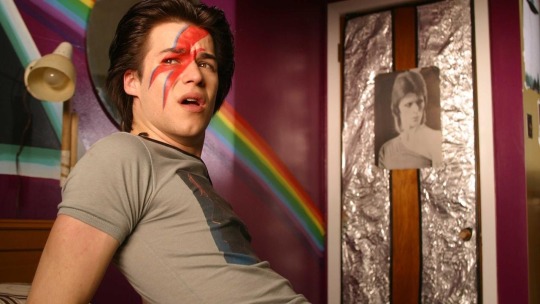
A Cinematic Outcoming.
From Istanbul to Chicago, and C.R.A.Z.Y. to Spirited Away, Letterboxd member, writer and film programmer Emre Eminoğlu explores the films that drove his gay awakening.
“I see it as my duty to never shut up about how representation matters.” —Emre Eminoğlu
I was one of the luckiest ones, yet I had no idea how lucky I was. Growing up in Istanbul, Turkey, a predominantly patriarchal, conservative and homophobic society, my luck was being born into an open-minded, secular and loving family.
In this bubble, I was isolated from the struggles of the majority of my people. I was not bullied at school by my peers, I was not forced into being someone else by my family. Yet I still had that voice in my head. As soon as I realized something could be different with me, I became my own bully and forcefully adopted a fictional persona: ‘exceptionally normal’.
Coming out was hard, but coming out to myself was harder. Although I was perfectly aware of my sexual identity, I could not come to terms with the possibility of being ‘abnormal’. Cue cinema. Watching films was a way of escape for high-school Emre—it still is—and it was inevitable that I would come across some LGBTQ+ films. I was not consciously in search of a ‘truth’ about myself but I started seeing my reflection in them, as they slowly disarmed the bully I involuntarily created.
Twenty years later, now, as a 34-year-old gay man professionally writing on cinema and television, I see it as my duty to never shut up about how representation matters. Streaming LGBTQ+ shows on various platforms, seeing widely released, mainstream LGBTQ+ films, listening to the music of openly LGBTQ+ stars, and hearing words of wisdom like “If you can’t love yourself, how in the hell you gonna love somebody else?”, I am confident that the personal, inner bully that I created twenty years ago would not survive a week in today’s world.
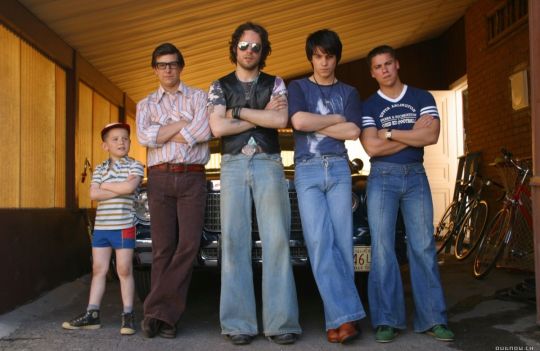
‘C.R.A.Z.Y.’ (2005)
Jean-Marc Vallée’s C.R.A.Z.Y. (2005) was definitely not the first LGBTQ+ film I ever watched, but it was an invaluable juncture in my life. It was a hot summer in Istanbul, freshman year of college was over. One of my best friends, who had been accompanying me through most of my cinematic discoveries, told me about a French-Canadian film with this guy on the film poster with David Bowie makeup on his face. We headed to an independent theater in Kadıköy to see it.
Zachary Beaulieu was different. As the lone gay son in a family of five boys, he too was forcefully adopting a fictional persona, and his way of escape was music. He was constantly worried about how to be worthy of his parents’ love, how to realize their ideals of him, and how his difference and truth contradicted all of that. Zac’s 1960s basically mirrored my story in the 2000s. I perfectly muted the life-changing enlightenment I was going through and did not vocalize my inner screams.
In two hours, C.R.A.Z.Y. helped me realize my true self and admit my sexual identity after all those years. It was a personal threshold I had been longing to cross… but there was still a lot to go through.

‘Les Amours Imaginaires’ (Heartbeats, 2010)
Liking someone, falling for someone, being loved, dating someone, sex, refusals, misinterpretations, heartbreaks, break-ups, bad sex. On the other side of the closet, I was being introduced to new, sometimes euphoric, sometimes gut-wrenching experiences. But coming out to my friends was still a challenge. I was feeling so lonely keeping all these wonderful and horrible experiences in my chest.
But I was not alone: LGBTQ+ films were my life’s understudy. The same heartbreaks, worries, and disappointments I was going through were right there on the silver screen. I took note as two best friends, Francis and Marie, fall for the same guy and navigate their friendship in Xavier Dolan’s Les Amours Imaginaires (Heartbeats, 2010). I studied how a popular student, Jarle, falls for the new guy in school, but cannot risk his reputation to be with him in Stian Kristiansen’s Mannen som Elsket Yngve (The Man Who Loved Yngve, 2008) and I watched as close friends Tobi and Achim become lovers, until one’s need to keep everything secret threatens to destroy the relationship in Marco Kreuzpaintner’s Sommersturm (Summer Storm, 2004).
Things were not always accessible via online platforms and the internet, so film festivals were often the only chance to see the latest independent and queer films. Two of the biggest film festivals in Istanbul, thankfully, had LGBTQ+-focused sections; !f’s Gökkuşağı (Rainbow) and Istanbul Film Festival’s Nerdesin aşkım? (Where are you, my love?) felt like home.
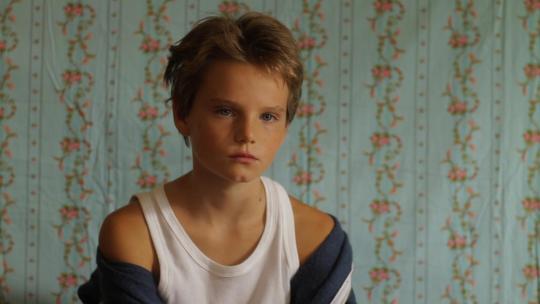
‘Tomboy’ (2011)
Being the lone avid cinephile among my friends, I was used to seeing half of my festival picks alone. Even before coming out to myself, my hopes for a romantic relationship included, among other things, having a festival partner. When I, fortunately, found the one, I was delighted to have also found the perfect festival partner. Shortly after our first month together, the first film we saw at a film festival was Céline Sciamma’s Tomboy (2011).
Although I was a 24 year old cis man, I was more than able to empathize with the title character, a ten-year-old trans boy. With his family unaware of his true identity, Mickaël experiences the liberation of a fresh start when ‘mistaken’ for a boy after they move to a new neighborhood—finally able to introduce himself as Mickaël, not Laure.
Changing my career path, a new job in the creative industry, and a stable relationship had similar effects on me. I was still not completely out to my parents, or some of my friends, schoolmates, and acquaintances from my past, but I was freed of the obligation to explain anything to my new friends or colleagues. I would proudly introduce them to my boyfriend, or simply correct people by saying I was attracted to men during a conversation. The perfect festival partner turned out to be a perfect partner as well—over the past ten years, he has helped me grow and be proud of myself.
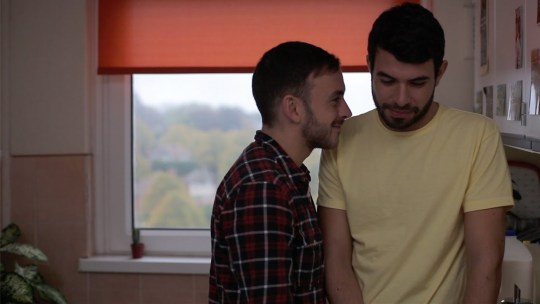
‘Weekend’ (2011)
We moved in together in the fifth year of our relationship. Right above our bed hangs a poster of Andrew Haigh’s Weekend (2011). At the time we saw it, it was just another film that we watched together and liked—no significance, no symbolism. It is the story of two young men, Russell and Glen, who are fascinated by the connection they find between each other, and are surprised how their one-night-stand evolved into the perfect weekend. When Glen reveals that he will be leaving for another country the very next day, it only makes their connection stronger, and their time together more precious. Being a timid and socially anxious person, none of my romantic relationships or my friendships had formed this organically. Even my first date with my partner was a disaster. We built what we have now over time, slowly and patiently. I did not believe in ‘weekends’.
And yet, one summer night, we met a guy on Grindr, as we occasionally did. What we thought was just another one night stand was in fact a transformative experience for us both. Intense conversation, a triple connection, the drinks we enjoyed instead of hurrying to bed, and the passionate sex turned that casual one-night-stand into a magical reality for us. We realized that we still had feelings and instincts to discover in ourselves and in each other. Over a week-long, unexpected, unpredictable polyamorous fling, we learned to act as one instead of two—only to find out that he was leaving for another country the very next week. This was our ‘weekend’.
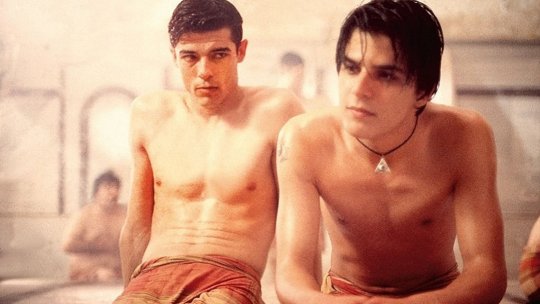
‘Hamam’ (Steam: The Turkish Bath, 1997)
Thinking how LGBTQ+ films of other cultures and languages had played a significant role in some precious, threshold-crossing moments of my life, it was alienating not being able to feel embraced and represented openly in Turkish cinema. There were certainly multiple Turkish LGBTQ+ films or characters, but they were in films addressing more urgent issues—right to live, violence against LGBTQ+ individuals, honor murders, trans murders—rather than the nuanced experience of queer love.
Although I discovered it years after it was released, Italian-Turkish director Ferzan Özpetek’s Hamam (Steam: The Turkish Bath, 1997) was a mind-blowing experience for me. The relationship, and the sexual tension, between Francesco, the Italian heir to a building with a Turkish bath in it, and Mehmet, the young son of the family managing the compound, felt much closer to my story and my cultural, familial identity.
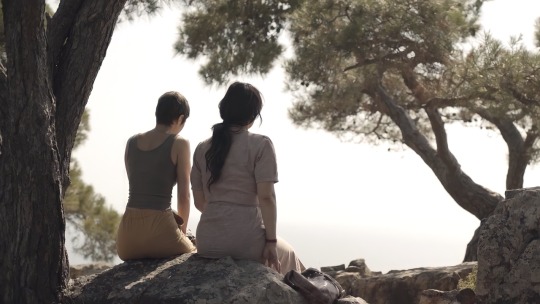
Aşk, Büyü vs. (Love, Spells and All That, 2019)
Today, I am glad to see more and more filmmakers finding the courage to maintain the LGBTQ+ narrative in Turkish cinema, despite the oppressive, intolerant and exclusionary policies. Some are telling the youthful, urban stories I was longing for at the time: In Leyla Yılmaz’s Bilmemek (Not Knowing, 2019), Umut, a high-school athlete from a middle-class family in Istanbul, is bullied by his so-called modern and open-minded teammates after not replying to a query about whether he is gay or not. In Ümit Ünal’s Aşk, Büyü vs. (Love, Spells and All That, 2019), Eren and Reyhan, two adult women reunite in the magical atmosphere of The Princes’ Islands on the Istanbul coast, decades after they were forcefully separated by their parents.
The story of me coming out to myself all started with an urge to escape reality through cinema, and on the way, I found films that gave meaning to my muddled existence. When I saw Levan Akin’s And Then We Danced (2019), I smiled as I noticed the Spirited Away poster in Merab’s room; this minor detail another reminder that I was not alone. Merab, a gay dancer who is part of a very traditional and conservative Georgian dance company, was dealing with similar challenges in his life. He was trying to discover his true identity in a society that does not celebrate being different. He was too, finding an escape in cinema.
Coming out was hard. It still is. A recent Instagram post by the 27-year-old actor Connor Jessup, who came out as gay two years ago, reminded me coming out is not a single moment, but a never-ending process, a ‘becoming’. He writes, “When I first came out, a friend wrote to me and said, ‘Now you can really start coming out.’ Start? I thought. I just did it. But he was right. […] I’m going to keep trying. I’m going to keep looking.”
I keep trying, and looking. Learning about myself, my identity, my relationship. And LGBTQ+ films keep helping and inspiring me, just as they did in my journey to accept myself and become the person I am today. This is the power of cinema; unconsciously, you see your past, actuality and possibilities through the stories filmmakers tell. And I am so grateful to these filmmakers.
Related content
The Ten Greatest Turkish Films of All Time, according to the Turkish Film Critics’ Association
Emre’s Favorite LGBTQ+ Films: a personal top 50
Queer Films in Turkish Cinema—a list by Atakan
The Top 100 Turkish Movies of the 21st Century: Emre’s personal favorites
#letterboxd#pride#pride 2021#lgbtqia cinema#lgbt film#turkish cinema#turkish film#queer cinema#coming out#jean marc vallée
26 notes
·
View notes
Text
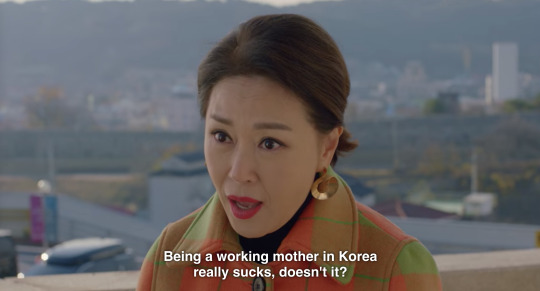
So much of this episode is about the unacknowledged labour of women, the sexism they face in different areas and the various methods women adopt to negotiate it.
Ji-Woo is such a great character because the show takes the idea of a film star and layers it with angularities and tenderness. She's well aware of what she's sacrificed on the personal front to become the successful professional she is in the present. I love how she's neither ashamed of it nor does she ignore that its a choice that came with lots of unpleasant baggage. We get a sense of this awareness in the conversation she has with Seon-Gyeom in the parking lot (it's also striking me as I rewatch the show that there's a beautiful little arc of Seon-Gyeom and Ji-Woo building a mother-son relationship almost from scratch).
The church scenes are also a great example of show-don't-tell storytelling. While Assemblyman Ki has to bribe and flatter people in order to get their attention, adoring gazes turn to Ji-Woo seemingly automatically. Except of course, it's not automatic, as the conversation with Ms Dong reminds us. Her fame as an actress is the result of hard work and putting everything else aside. I love the easy understanding between Ms Dong and Ji-Woo — both working women, both mothers. There's no shame in Ji-Woo asking Ms Dong to look out for Seon-Gyeom and no recrimination when she says Seon-Gyeom is closer to Ms Dong than he is to his mother. It takes a village, people.
In Ji-Woo and Seon-Gyeom's chance meeting at the parking lot, there's something tentative and formal about them. They're both putting up façades — Seon-Gyeom's polite mask, Ji-Woo's tinkling laughter — although she does allow him to glimpse what lies beneath. Ji-Woo only drops a vague mention of Assemblyman Ki making life miserable for the rest of the family because Seon-Gyeom isn't falling in line. It's obvious from both mother and son's body language that she doesn't need to elaborate. What's lovely though is that there's no complaint in her tone. She isn't telling Seon-Gyeom this detail so that he feels guilty; quite to the contrary. The laughter and ease of her body language is reassuring, as though she's subtly telling him that she can handle this.
While we're on Ji-Woo, how great is her barely-concealed impatience with all the smiling and greeting and praying in church!
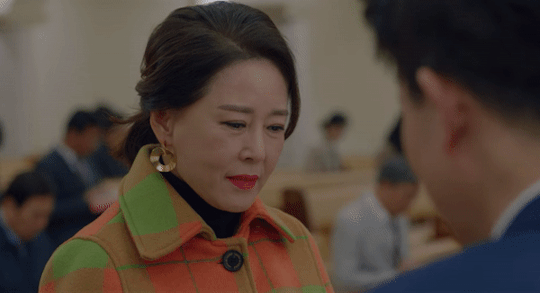
I'm not sure what I love more — the shot of a the stained-glass Jesus, looking pained while the minister thunders out a prayer for Assemblyman Ki; or the fact that the very next scene shows a kid throwing a tantrum in a supermarket. It cannot be a coincidence that this is the one time that Seon-Gyeom is filmed from an angle that makes it look like he's descending down upon the kid (whom he bribes with a chocolate bar). Particularly love the longing on the kid's face as she stares at the retreating figure of the divine Seon-Gyeom.
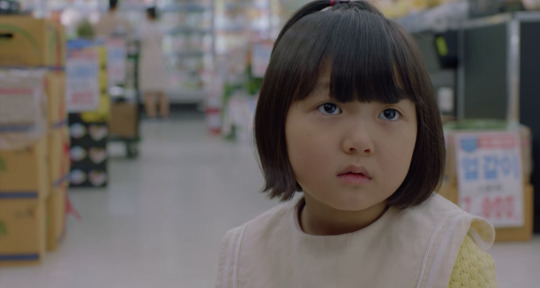
The scene between Mi-Joo and Seon-Gyeom outside his hotel is so heartbreaking to watch and it's the first time we understand just how hard Mi-Joo is on herself. All this began with a drunk professor making offensive, sexist comments that demeaned Mi-Joo, but to explain all that to Seon-Gyeom feels almost indulgent so she takes the blame. She's the disappointment — for being poor, for being seen as someone who can be bribed, for having taken the money. She doesn't hear him when he places the onus of the blame on his father. It's so achingly obvious that all her belligerence is posturing and she's ending the budding relationship between her and Seon-Gyeom because she doesn't think she deserves him.
Thank the gods for May. Even if she and Mi-Joo start off at odds, it takes only seconds for them to be in sync. God bless the womance.
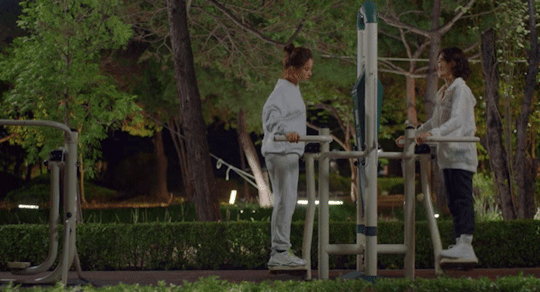
You've got to feel thankful for the family of choice when Dan-Ah bumps into human-trash brother. He's a strong reminder of the everyday sexism in society and how privilege doesn't mean you're protected from this venom.
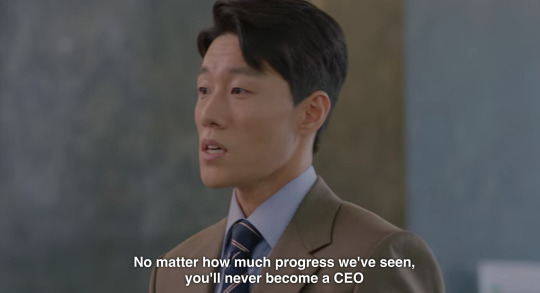
Over the course of Run On, Dan-Ah figures out how to fight her battles in her own way, rather than by employing toxic methods, like putting her (half-) brothers down because society considers them illegitimate. At this point though, while her brother is disgusting and Dan-Ah is obviously nothing like him as a person, the weapons she uses to fight him — hierarchy, contempt, violence — are the same as those he uses on her.
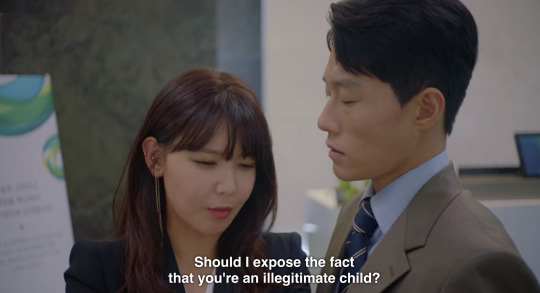
In the middle of all these tortured, messed-up men, the kids are alright. We know this from not only the way the schoolkids whom Seon-Gyeom coaches react to the bullying scandal — interesting that the children have more perspective than the grown-ups who care about appearances rather than the truth — but also thanks to Yeong-Hwa.
I love Dan-Ah trying to subtle suss out exactly how young Yeong-Hwa is when he and Ye-Joon come to Dan-Ah's office. I also love how not for a second does Yeong-Hwa, for all his puppy-eyes, call her "noona". There's no ambiguity about this relationship. Also, while I still can't find anything remotely good to say about those wretched paintings, the idea that art forges connections irrespective of social convention/ hierarchy is one that has my heart.
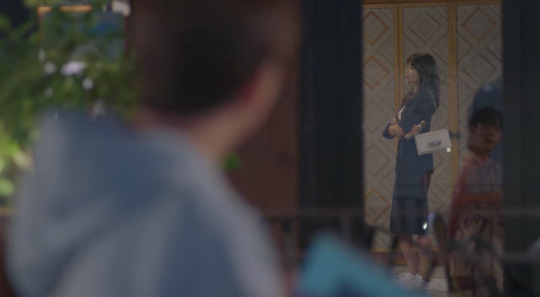
If the Gyeommi couple is all about being heard and understood, the Danhwa couple is all about being seen for what you really are.
Speaking of Gyeommi, how cute is it that Woo-Sik is the one playing Cupid! In this episode, Seon-Gyeom is frequently reminded of how alone and solitary he is, but what we also see is that he's building friendships. The relationship with Woo-Sik changes from that of a senior with a junior colleague to something softer, warmer. With Mi-Joo, particularly at the dinner that Woo-Sik organises, you see Seon-Gyeom finding companionship as they attempt to set aside their attraction and actually understand each other. This is a relationship that works because they're so different. The fact that they don't think alike is why she can offer him the piercing insight of, "Why not include your failures as a part of your process?"
Also, what a bombshell to drop on audiences in a country (and continent) known for its fiercely competitive spirit... .
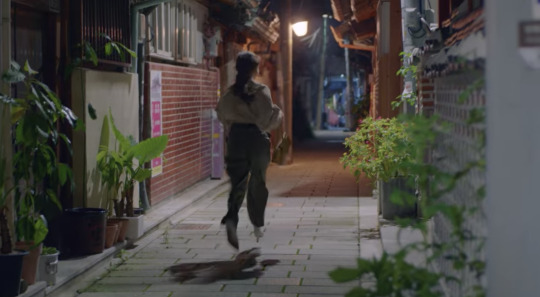
Rewatching this episode, Mi-Joo running back to home to translate the article in which Woo-Sik clears Seon-Gyeom's name reminded me of how different this is from the marathon run. Both times, she's running towards Seon-Gyeom, but this time it's more adrenaline than anything else and it's for him. It's the unthinking running that Seon-Gyeom told her about during their first drinking session — you're just running ahead, without looking back, focused on one external goal. The marathon run is much more internal as it pushes Mi-Joo to make peace with her past before she decides what she wants to run towards.
Also, looping back to that idea of unacknowledged women's labour, Mi-Joo works HARD to make sure the article goes viral and she claims no credit for it. She only tells an online group that she translated it because she knows that they will circulate it with more gusto if they know it's her work. This little snippet is also a good reminder that rarely do things go viral without a whole lotta effort from people in the background.
Finally, this hug in the rain turned me into full mush. By now, we know that Seon-Gyeom has grown up with very little affection. He prefers a hotel room to the family house. The only person he's felt comfortable enough to hug is the housekeeper. As far as he can tell, he has no friends (Woo-Sik and Yeong-Il will eventually set him straight on that account, but for now, he's utterly alone). At this point, the hug from Mi-Joo is something much more tender and basic than romantic love or sexual chemistry.

MJ: Don't tell me you don't know what I'm doing.
SG: I know. You're comforting me.
MJ: Correct.
I can't help but remember the later scene when they'll be on either sides of metal gates, when she won't reach out to him and he'll be upset that she won't trust him. Perhaps that's the difference between finding friendship and falling in love — they both can make you stronger, but the process is very different.
50 notes
·
View notes
Text
Morality-Focused Frameworks Of Discussion As Acts of Control
This is a post in response to a larger conversation I’ve been having with @eshusplayground. I have a perspective that I think would be really relevant to the conversation but I also don’t want to derail the specific focus of the following posts she’s been making recently.
(Trigger Warning For Abuse Discussion and Brief Mentions of Rape)
---
So I’m in the Hellraiser fandom. More specifically, I’m a Pinhead/Kirsty shipper.
For those of you that don’t know, Pinhead is a demonic torturer from hell who’s design is inspired by the BDSM community. Characters who open a magical puzzle box have unknowingly given themselves away to his violent underworld community of eternal torment and depravity. Hellraiser is a film about romantic and sexual horror, and there’s quite a lot in there about abuse and trauma. Kirsty is a traumatized person, and in my personal opinion, very likely a CSA victim.
And I ship these two characters together.
So the subject matter of my particular fandom is extremely intense and niche and complicated to navigate, although YMMV (I have no trouble with this franchise, but I cannot really handle GOT or American Horror Story, for example). After I grew interested in Hellraiser and integrated into it’s fandom, my perspectives about the way we have conversations about villainous characters started to have a major shift.
I often see people have these intense conversations (and arguments) about where a particular character exists on a moral scale, with the subtext (or outright text) that if they tip too far one way or another, they can be rendered unworthy of their own subgroup of fans within their own fandom. People who love those characters or find them shippable are then subject to moral judgements.
So how does one apply such logic to a psychosexual torture demon?
The answer is you can’t.
The frameworks people online use to have these discussions do not make any sense when talking about my fandom. Hellraiser is a dark horror fairytale presenting disturbing, surreal images and behaviors in order to discuss complex and difficult experiences and perspectives. The monsters within it, like Pinhead, are more metaphor than anything.
Now, my follower count is too low and my fandom is too niche for me to really be on the receiving end of a lot of the cruelty that manifests online about the moral validity of the fiction I enjoy. That said, between the anti-kink TERFS and the younger folks involved in purity culture on this site, I can imagine exactly what it would look like. You know what they would look like.
“You’re an Abuse Apologist!”
“You’re an Abuse Fetishist!”
“You’re reinforcing sexism!”
“he’s an irredeemable torturer, you’re probably okay with literal real world rape lmao uwu”
“This is bad kink representation and you’re complicit in the abuse real men do to women because you like this!”
Now, setting aside the fact that the canon lore context of Pinhead involves him having a human soul brainwashed by a monster god to become what he is, and is also in a roundabout sense “redeemed” in canon, I think most people utilizing this kind of framework would assume that I believe Pinhead can be redeemed in the way online Discourse (tm) means it, because that’s how we talk in fandom about the villains we really like.
I do not want to redeem Pinhead. I don’t think he even needs redeeming. I don’t even see value in that conversation at all. Redemption is not a concept that makes sense for what he is, or what he could become as a character. The framework of Pinhead as a Real-World-Equivalent Human Male Abuser who Cannot Be Redeemed From His Actions would inevitably dominate all conversation, regardless of the fact that it is inherently incorrect and detrimental to real, robust literary analysis of the narrative he exists within and how brilliantly it actually interacts with male on female abuse as a subject. By nature of it’s gross oversimplification and misrepresentation, It ruins the potential for greater, more nuanced and complex conversations.
And that’s the thing: my engagement with this particular story and it’s characters has a lot to do with the potential in the narrative to examine how trauma interacts with love, desire and gender politics. Hellraiser has a very unique way of exploring that kind of subject through a storytelling aesthetic that appeals to me (horror/fairytale, gothic romance, etc).
This is about to get personal, so strap the fuck in.
I am the victim of gendered abuse, in that I had an emotionally abusive step father and sexism was absolutely a factor in why that manifested the way it did. I am also a second hand victim of gendered abuse, in that my biological father was a serial stalker and rapist, and other male abusers (or just self-centered family members) caused severe emotional destabilization in my childhood. I grew up viewing adult men as unstable, selfish children. My family endured a lot, and I came to resent the men in my mother’ life for not taking on the role of protector and nurturer when she needed them most. I had discovered the great lie of traditional masculinity: in the face of real crisis, grown men were not protectors. They did not hold together the domestic space. They abused or faltered and abandoned us. This was a repeated pattern among several men in different roles. I was often left picking up all the pieces, taking on roles as a child that these men could not. I had to have strength they did not.
My experience of desire for romantic intimacy with men and men in roles of stable, nurturing authority now inherently involves a jumbled emotional soup of fear, pain, and a deep longing that comes from a place of feminine vulnerability, a desire to be taken care of instead of being the caretaker.
The narrative of Hellraiser pushes a lot of buttons for me. It speaks to my own trauma experiences in a very specific way. In an effort to further that conversation, I’m trying to create a piece of art (a fic) inspired by the deeply personal feelings this film gives me.
For me, Pinhead represents the Jungian shadow masculine, a simultaneous mix of fear and desire, the potential for suffering and pleasure, and everything in between. These experiences are inherently intertwined for me. And Kirsty’s experiences mirror many of my own.
In other words, in order for me to get out of Hellraiser what I get out of Hellraiser, Pinhead has to be exactly what he is, and everything that he is. Which includes monstrosity. Which includes the potential for change. His place in the narrative must fully, truly embody this conversation I need to have with masculinity, which inherently involves painful, scary things.
Anybody demanding that I either denounce my interest in him as morally offensive because he’s a monster in the full sense of the word (and not just the aesthetic one like what is currently trending in Monster Boyfriend fandom), or force a traditional redemption arc upon him as if he were a real life human person who must repent for his real life sins, are essentially saying that I am not allowed to engage with this work of fiction in a way that is transformative for me. And that’s very unfortunate, because honestly, I think my perspective is so much more dynamic and has so much more to offer.
This is not just about basic catharsis. This is not even a power fantasy about emotionally transforming a powerful (white) dude, or “bad boy” fantasies, both standard arguments for villain stanning that feels like it has never truly represented me or the complexity of my experiences and interests. This is a full-on conversation and act of self expression I want to have through art about the experience of fear and trauma when dealing with men as a woman who desires men.
And I don’t think a person has to be traumatized in order to want to engage with this type of fiction. I want to be clear that my experience is not a justification for my interest (I do not need to justify myself), it is an example of a perspective that gets erased by the framework of these conversations.
To me, the framework of moral validity for enjoying fictional villains and monsters and whatever you please feels incredibly stifling to the complex, dynamic ideas and analysis that I want to engage in, because I, and many people I know, are consistently pressured to structure their thoughts with this framework as the only acceptable baseline of discussion. This is so ubiquitous that when people I’ve known have tried to engage in ways that diverge from that framework, the responses they get are outright confused or direct the conversation right back to the original framework they tried to avoid. Complex conversation gets steamrolled.
Somewhere in the conversation we were all having about acknowledging and discussing abuse and oppression, and acknowledging troubling patterns in media which reinforce the normalization of abuse and opression, some people decided that there was a very serious moral discussion to be had regarding the mere act of liking things which involve dark subject matter and complex, or even monstrous characters. They now argue that there are very clear cut, simple moral frameworks for A) telling stories and B) enjoying stories, and most importantly, that this moral framework is a valid justification for the social treatment and silencing of certain people.
A framework, by the way, which I think is actually not functionally a framework, because like the toxic American fundamentalist christian groups it’s thinking is structured from, it does not account for the vastly diverse moral landscape within it’s own space. There is no objectively consistent body of knowledge anybody is working from, because morals are derived from the human experience, which is inherently subjective.
Interestingly, no where does this have more of an impact than with marginalized people, and people like me, who want to express something deeper and more meaningful in the conversation about abuse and oppression than what this framework really offers us. To be honest, The more I see this kind of conversation making the rounds, the clearer it becomes that it’s a means of control and power game playing. It’s not about morality, but about how morality can be leveraged in order to silence truly diverse and nuanced perspectives and uphold people’s sense of self-comfort. It is a means of supplanting more convenient and easily digestible understandings of these highly complex subjects that require more intensive, thoughtful engagement, especially when it gets challenging. This kind of rhetoric absolves people of making room for complex and diverse experiences, and reinforces an (at face-value) easy to follow set of moral rules of how we are all allowed to think and feel.
The implication of all of this is that if we all adhere to the One True (alleged) Moral Framework of Fandom Engagement, then we will somehow come out on the other side with all the Good People having a Great Time having Squeaky Clean Fun. And I don’t think I should have to tell you at this point how stifling and disturbing the implications of that kind of mentality really are.
Quite frankly, I think a lot of us are very tired of constantly speaking on other people’s terms.
32 notes
·
View notes
Text
assorted thoughts about farewell my concubine which i watched the other day w my mom who like sparknotes’ed the movie for me as we went along. she’s my no fear shakespeare. anyway putting them on tumblr bc i find it better for archiving purposes. ty to max for talking the movie out w me after 😊
spoilers obvi
the whole "by nature i am a boy/girl" stuff reminded me a lot of the concept of sexual inversion which was like when old homophobes assigned men the action of "liking women" and vice versa. thus linking gay men w femininity bc they like men which also sees a trend just like in Society(tm). at the beginning everyone else is super happy when douzi gets the line right but there's still smth like hollow? about that scene to him. when he adopts the baby, taking on the traditionally feminine role of caretaker. and then at the end when they both get the line "wrong" but he like almost reclaims(?) himself as a boy. yeah. and ofc when leslie cheung says that thing about a good actor is androgynous in one of his later interviews
but then right after that he kills himself which could be bc he recognizes that their socially conservative society won’t allow them to be together or bc he wants to end his life w what he sees as a symbol of their love..? or maybe it just isn't more complicated than what xiaolou says earlier in the movie when dieyi asks why the concubine has to die: because that's the play!
that said it is very weird that people take that line to mean that playing the concubine made him confused about his gender and start liking men or whatever, which is smth my mom said and apparently a lot of articles online. like gd that Is the concept of sexual inversion which is obvi not how being gay works but also just narratively dieyi's feelings for xiaolou def started before he started playing that role
i also think there's a lot to do w fate, like when juxian leaves the brothel and the manager person (i know there has to be a better word for this but god i cannot think of it rn) gives the whole "once a whore always a whore" speech. and then in the end when juxian is villainized bc she used to be a sex worker
but then i’m also kind of confused bc when they first introduced the story of farewell my concubine (the opera) they said it means you only control your own fate...? hm.
also there was SOMEONE talking about karma earlier in the movie which i remembered when dieyi starts yelling about retribution at the denouement but i can’t remember who and in what context and it’s nagging at me
maybe the sword as a symbol of their struggles? it always appears at important moments in their life as almost this recurring character - douzi wanting to give shitou the sword when they were younger, when yuan and dieyi first meet (ew), when yuan and dieyi drunkenly recreate the opera scene and dieyi puts it to his neck, when xiaolou is being interrogated, i’m def forgetting some - but then it's interesting bc when xiaolou throws it into the fire, it's juxian who goes to retrieve it and returns it to xiaolou before hanging herself like she recognizes its significance
smth smth subversion bc xiaolou who is supposed to play the Man is the first to crack, whereas juxian never snitches on anyone even as she is forced into the spotlight
also think it’s weird that people don’t think dieyi’s love was reciprocated? xiaolou left juxian after her miscarriage to go find dieyi and slapped her for telling their shifu that dieyi was addicted to opium. there’s def more but those are two scenes that stick out to me
anyway i too am in love with leslie cheung and gong li. xiaolou kinnie moments
ALSO the behind the scenes vid was so fun and insightful. can’t believe the scene of juxian jumping into xiaolou’s arms and the scene of their shifu beating xiaolou as an adult were real wtf. and having to film the scene in front of the fire in 90 degF beijing weather in full opera costume omg
really appreciate the research that the actors put into their roles - like gong li reading books about sex workers in that era of china and leslie cheung’s extensive training for his accent and jingju such that they didn’t even have to use the doubles they’d hired
love love love all the callbacks throughout the movie - when xiaolou says “i’m the one to blame, hit me instead” like what douzi did at the beginning of the movie after he and laizi ran away (oh and laizi also. man.), when dieyi says the same thing to juxian and rejects smth she offers at her and xiaolou’s wedding party and after no one tells dieyi that xiaosi was supposed to replace him as concubine yu
the editing for the part where the eunuch rapes douzi was so chilling and so good - the pan to the painting and then the bell toll, and douzi staying silent when shitou asks him what happened. fuck.
also really enjoyed the scenes when dieyi and juxian would be petty towards each other for more shallow reasons lol
i have thoughts about xiaosi that have not really crystallized yet. passing down the torch gone wrong etc etc...
#farewell my concubine#i want to get into chinese cinema more but the industry kind of notably sucks#ah well. a problem for after i work my way through leslie cheung's work#if anyone wants to give me recs.... 😳#julia watches movies
16 notes
·
View notes
Text
TV Series Review: Miss Scarlet and the Duke (2019)
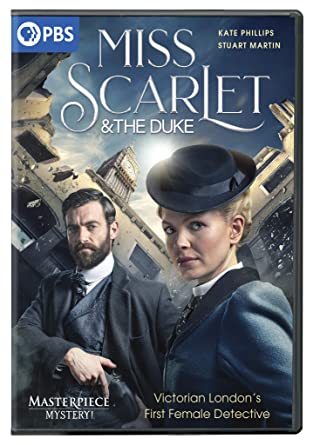
Genre: Historical Fiction/Murder Mystery/British Period Drama
Rating: 10/10
TV Show Review:
I. LOVE. THIS SHOW.
Pretty much this review will be me talking about everything I love this series, just a warning. I hope you love it too, so you can enjoy my blabbering and gushing!
I will do this review a bit differently, since it’s still relatively new, especially here in the US. I’ll talk about my general thoughts, and then I’ll do a “keep reading” when it goes down into spoilers for each episode.
So, here, for the spoiler-free part of my review:
Let me start out by saying that these characters make the whole damn show. Yes, the mysteries are great and all, but it’s the characters in this series, for me, that drives the whole thing. Eliza Scarlet is a masterful main character, and I love everything about her—from her determination, her willingness to fight the crowd to be what she wants, how she’s willing to admit some issues, that she still relies so heavily on her father after he passed away. Her humor is so incredible, and I think she’s just someone I wish I could be. Her feistiness is so wonderful. And then our Inspector Detective William “the Duke” Wellington is… one of my favorite leading men, fictional of course. I like that he’s overprotective of her (sometimes, to funny extents), that he does his job well and follows a lot of the right paths, that he doesn’t seem surprised by much of anything, and that he’s willing to fight even when he’s falling apart at the seams. And their relationship! They are so clearly in love with each other (probably have since that “chaste kiss” when they were teens…), they bicker like a married couple, and though they annoy the living hell out of each other, they would die for one another. I like that their relationship isn’t perfect and they take note of that in the show, but it feels real. It’s one of the most real relationships I have ever seen.
Moses and Rupert are such important characters and I LOVE their relationship with Eliza, their friendships that seem so different, but they just fit. I can’t go much into detail about either of them, or it will spoil entire plotlines of mysteries, but I will say that I love what the story does with their characters, how it gives them breaths of their own, that they become some of the most dynamic characters in the show with so much to them and that take a life of their own. That they feel real and important and interesting, and I love the representation. That’s all I’ll say about them in the spoiler-free review.
Now, the mysteries, were incredible. They kept me guessing through every episode, and I would have some feelings about things/people, but I wasn’t sure how it would get there. At times, I thought of the truth, but figured that they were going to trick me with it (my grandpa always told me that I have a brain for a detective, if I had some training, so that’s fun!). But still, they were so innovative and different from other mysteries that I had experienced. And I liked that each episode felt a bit different—we had a taste of ghost story feeling, even an intense thriller. They were really, really good mysteries, to me at least. And I do love me some mysteries.
Okay, so the costumes, sets and music. MY GOD. It was all SO BEAUTIFUL! Eliza’s clothes were magnificent and they had POCKETS!!! William was way too sexy in those clothes (can we bring those back??? We can leave out the discrimination that came with the time period, but let’s bring back the clothes at least!). Everyone had gorgeous clothes. And the sets were beautiful—those dirty, Victorian, coal covered streets… I loved it! (My mom says she’s not sure why I’m so in love with the dark atmosphere of the Victorian era, but I am!). The MUSIC. Can they just upload a damn soundtrack already? I need to listen to this music all the time! It sounds different and cool and I’m just so in love with it.
THE HUMOR! My god, I had never seen a murder mystery show set in another time that does humor so well. I love how they travel between scenes to make it funnier, the lines they say to one another. It makes me feel like these actors absolutely had a blast filming this show. They were so on point, and some of the funny scenes made me laugh harder than any comedy movie I’ve seen.
As you can see, I’m obsessed with this show altogether. I love it, and I want to watch it over and over. The vibe, the love stories, the characters, every. single. thing. is my jam. I know they’re planning a second season and I cannot wait for it. Ugh. My god. It’s wonderful.
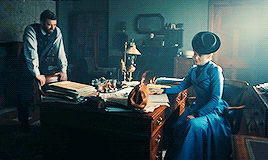
So here ends my spoiler-free review. After this, I’m going to talk spoilers. So if you have seen the show and/or want to read the spoiler-y thoughts, please click on the “keep reading.” If not, see you around after your watch the show! It’s well worth it!
Let me start out by explaining more of my thoughts on the relationship between William and Eliza, because I worried that some of what I had said would give away possibly too much. So here’s that part:
The (hilarious) way that William mutters “oh jesus” whenever he finds Eliza waiting in his office, or the fact that Eliza calls herself his wife (or in one instance, something worse, but to save herself) to get what she wants also feels like a sly to personally agitate him. How that he would toss her into jail/into court when she went against things he said she shouldn’t do (though he released her/got her out at some point) never got old and even funnier to me each time. I told my mom, she was like a toddler—he couldn’t keep her in sight, so he had to lock her out. But I liked that she still argued with him despite it. Their back and forth was perfect.
I will say here, that I have seen people’s comments online how they wish that William was more on board with Eliza’s detective dreams and support her 100% much earlier on. And I get that, that he can seem like an ass at times. But honestly, I think he feels more realistic that he’s a little harder about it in the beginning. Trust me, I love this show and the way they play with characters and storylines, and that they are so forward (I mean, Eliza is so forward-thinking and modern, it’s amazing), but to me, if they made EVERYONE, i.e. William especially, it wouldn’t ground me into the time very well. I like that it was more gradual for him, to fully support her. And actually, I think for a man in the Victorian Era, with his position, he supported her as much as he could. Though he fought her on it at times, he eventually gave up trying to stop her. And I do think, in some respect, he was trying to protect her, because he does care for her. He was a man of his time, in his position, and he is changing. Can we at least give him that? Because, in all throughout history, it took a while for things to change. And it was men like William that started to understand, that started to recognize that, that helped make it happen. Plus, Eliza didn’t let him pull shit all the time, and she did fight him on it.
Now, I’m going to comment on each individual episode with my thoughts. I’ve never done this before so yay! Here it goes!
EPISODE ONE: Inheritance
I knew the weird uncle wasn’t the girl’s uncle. I didn’t expect that it was her husband (I should’ve!! We knew he was a cheat and a conartist!!), but I knew it wasn’t her rich uncle. I knew from the moment he came on screen—I remember thinking, this guy looks too young around his eyes. His beard and mustache look fake. So, I was right to an extent.
I can’t be the only one who was horrified to discover what the police did to women who worked as prostitutes or in dance halls—they could be arrested and searched for venereal disease? Seriously??? For men who were so obsessed with wanting their wives to “stay safe” and “be protected,” they sure were fine with flipping the case when it came to women that they would also gladly pay to sleep with? Why don’t they check the male clients who are PAYING for this industry. It was appalling and horrendous, and it made my skin literally crawl as they tried tying Eliza down to the chair.
On the note of that scene, Eliza calling herself William’s favorite whore to save herself is literally one of the funniest (though, darkly) things—especially in the next scene, when you see the two of them sitting in his office in silence and William is mortified, annoyed, and I think amused at the same time.
I loved how Eliza tricked that bastard husband—she set him up, AND she gave him laudanum to make him pass out? This woman knows what’s up!
Instantly from this first episode, I knew I loved this show and these characters. Eliza shows her charm and wit and humor and smarts. She’s skilled and I love her personality so much. Though I can see how she could be aggravating to others. William absolutely adores her. Rupert annoyed me a bit at the beginning, but by the end—when he asked Eliza to not marry him, I knew I would like him. And Moses! A Jamaican man brings in the race question of this dark, old world, but I love that he likes Eliza and finds her interesting. He’s terrifying, but I think he’s a good, decent man, he’s only trapped in this world because no one will let him be anything else. But he’s such a rich, interesting character.
EPISODE TWO: The Woman in Red
This episode brings in the reality of homosexuality in this world. That it has always been there (damn those bastards who think otherwise), but it has been hidden away. That men and women have to fear for their lives, and also marry people they do not want because they want to not be noticed. I loved finding out Rupert was gay—my mom called that one!—and the friendship he develops with Eliza. That he trusts her to tell a secret that could literally have him killed and ruined. And that Eliza doesn’t even blink, that she’s willing to keep his secret to the grave, and I cried when she basically told him that. It’s quite beautiful that Eliza even seemed to be grateful that he trusted her enough to give her that secret.
Which was used in interesting juxtaposition to the gay man, accused of murdering his lover, and his wife. I understand the woman’s hurt, that she loved this man and it turned out he didn’t love her in the same way. But that didn’t mean her willingness to let him die for a crime he didn’t commit was at all good or called for. With Eliza talking her down, to prove that the woman’s husband was innocent, I think proved that though she was hurt beyond reason, she did love that man who was her husband and didn’t want to see her die. It’s really a hard situation, especially during that time, when people were constantly shoved down their throats that homosexuality was bad. Not that I’m giving her a “it’s okay,” but I can understand the pain and confusion she went through. Especially because she pulled through.
Through this whole episode, we thought it was the wife that had murdered the lover (the other man). I was surprised to find out that he had killed himself, cut his own throat (which I had heard wasn’t possible to do—but my grandpa, who had worked as a detective, told me that is a myth people talk about, that it’s really easy to cut your own throat). That was a shock, and it made me so sad. That he was dying because he was unhappy, because he hated what he was, because of damn society telling him so. I actually started crying, because as someone who is bisexual, I would be condemned in this time during for openly being with men and women, though I couldn’t even compare to people who are gay or lesbian, because the situation is not the same. But I could connect, I could understand. And I hated knowing the pain all those people were in, that a man had killed himself because of what he was, and that another man had to live with that. It truly breaks your heart.
William’s response to finding out the dead man was gay was interesting. I thought his comment “in my line of work, nothing surprises you” funny, but also telling. He didn’t act disgusted, he didn’t mistreat the husband when they questioned him afterward. The show didn’t directly say his thoughts on homosexuality, but I got the vibe that he was “whatever” about it. Like he knew it was there, and he wasn’t condemning it publicly. That gives him credit, in my book.
Another great episode that got deep and beautiful.
EPISODE THREE: Deeds Not Words
Is this show just obsessed with getting right down to modern issues that were also faced in this time, but not as strongly discussed? Because I’m all for it! This episode was all about the suffrage movement. But I liked the take they did on it.
Yes, they spoke out about the treatment of women. That men, white men, controlled this whole world. But I also thought it was interesting that they made this main suffragette not the greatest person. It made everything complicated. Like, everything she said to Eliza made sense, and I found myself cheering with her. But she shot a man in cold blood, she was willing to bomb a whole building of men—even though it seems justified because of what their club represents.
I think this episode was discussing the balance. That there can be change, but when you attack the people who you are trying to change, it may not work in your favor. At least, that was the vibe I got. Not to stoop to their levels, to become just as horrible as them. Her ideas and words were great, but her actions were a bit… skeptical.
Eliza and William’s response were interesting as well. Eliza felt a passion for the cause, William thought it a bit extreme. But, to me, by the end of the episode, they had a common understanding, they had reached a comfortable middle. I think, this show was showing that was how change came. People seeing eye to eye, and then it spreading from there. Of course, William has faults, but I think he’s truly trying. Especially with each episode. And the more Eliza and he grow.
EPISODE FOUR: Memento Mori
We got our ghost episode! I wasn’t even expecting it, it was incredible! A ghostly image of a dead wife that had killed herself reappearing in photos? How wild and cool is that idea!
I didn’t know that the Victorians had a thing where they took photos of their dead loved ones, looking like they were alive (y’all, the Victorians were obsessed with death…), but it’s an interesting concept. Maybe even sweet. I get what they were trying to do, even if it did seem morbid. How I feel about it is, if it brings you peace, then go for it (as long as it’s nothing disturbing or harming anyone).
The twist was one I had a hint of but hadn’t expected the whole thing. I knew the daughter had something to do with it (how disturbed is this poor girl??), but I hadn’t expected that the mother had planned this before she killed herself because she knew the woman and her husband were already having an affair. It was interesting and a creepy twist, but I was all for it.
Still, I loved how we had moments of eeriness and the haunting feeling in the house when Eliza stayed over. I felt scared and freaked, and most people that know me know that I do not like horror. But this was the perfect eeriness, which I do love.
That scene from this episode where William screams at the poor telegram young man to give them the message or he’ll break everyone bone in his body and then being like “are you crying?” was the funniest thing I had ever seen. I laughed so hard that I couldn’t breathe. I mean, it’s terrible, but the way it was done was hilarious and amazing.
EPISODE FIVE: Cell 99
This episode was… dark. I liked that it was set in an abandoned prison, and my god, was it creepy as hell. I loved all the shots of William walking through gave me the chills.
This one felt like a thriller to me. How it was filmed, set up, how everything went down. Except for the hilarious scene when they are both so annoyed with each other (Eliza and William, that is) that they both scream in frustration is brilliant. But otherwise, it took a dark tone that made me feel like something was watching my back. Especially as that big, scary guy came walking down the stairs when William and Eliza were trapped, ready to kill them both. I was nearly screaming at the tv in utter horror.
My mom had called it—and I had a feeling—that Eliza’s father had been murdered, not just drinking himself to death and found in the gutter. And there’s a gang now? How interesting!
The masked man was strange, as well as the forger locked away. But he was shot and killed, and it confused me.
I have a strange confession to make: that whole time with William in his dress shirt (without the coat), with his arm covered in blood, was weirdly…. Hot? Please don’t ask me explain. I have weird things to me. But I think it was also hot that though he was hurt and bleeding, he was gearing up to fight that big, scary man to protect himself and Eliza. I like that kind of shit, so much.
This episode was twisted, and it left me with more questions than anything.
EPISODE SIX: The Case of Henry Scarlet
My mom knew William’s boss was in with the gang! I liked that they actually explored the reality of corruptness in the police force (my grandpa had personal experiences himself, and that was why he left), and they laid it all bare. Despite the things that we are learning in this present day, it’s always been there. Which is horrifying and disturbing. That these police who are supposed to protect us are willing to delve into the corrupt world to bring themselves more power and money. Because that’s what it boils down to, doesn’t it? Powerful men wanting more and more.
I liked that William was okay with the truth unfolding, and not fighting it, trying to prove innocence for his boss. To me, it made me feel like that he knew something was up with that man (just beyond not liking him). For his character, it made me think that he was one of those people that was actually good and good at his job, trying to do the right thing. Even if he got distracted and didn’t give Eliza credit where it was due, and fought some things, he was trying to do what he thought was right. He didn’t kill anyone, he didn’t go after anyone specifically. Though him and Moses had some standoffs because he wasn’t sure about the other man, he gave him some thanks and shook his hand. Which is huge for that time period.
I did suspect William’s buddy. I always felt like something was happening with him, and that he would be the perfect bad guy because he knew what was going on at all times. And it was proven right! Though it wasn’t any less terrible, William having to realize that his close friend at Scotland Yard as the bad, bad guy who killed their boss when things were turning ugly.
But Moses to the rescue! I loved that he swooped in, teaming up with Eliza, and taking the guy out! I love Moses so much, he’s one of my other favorites.
And their ending, with a promise of dinner, of love on the horizon was exactly what I needed.
Lasting thoughts:
Besides all the amazing storylines and characters they brought in, besides Eliza and William’s chemistry and relationship, to me, this felt like a story about a daughter and her father. We see flashbacks of Eliza as a child with her father, how he taught her his detective work, when that wasn’t something men did typically in that time, and how she would still talk to him after he had died. That though she had chosen this profession for herself, it was also some way to connect to her father. Something they had shared when she was motherless and only had him, and he gave her these skills and talents, helped her hone in on them. And once he had passed, she fought like hell to keep it, but make it her own. I liked that their relationship wasn’t perfect, but they loved the hell out of each other. She was a grown woman, who believed in herself, but she still turned to him—a ghost, a memory, or whatnot—when she felt at the bottom.
This series is incredible, perfect and just all around so masterful in so many different ways. I knew from the moment I heard about it that I would love it. And it turns out I was right, but even more than I had expected.
Now, I think it’s time for a rewatch.

11 notes
·
View notes
Text
I find the online version of the 1967 TV Times interview with Diana Rigg unreadable online, so I’m reproducing it here for anyone else who has difficulty with accessibility due to the web page’s design.
The Girl Behind Emma Peel, TV Times, 12/10/1967 (reprinted here from http://deadline.theavengers.tv/tvt1067a.htm)
...the two worlds of actress Rigg... above, as Emma Peel of THE AVENGERS; a series seen in 40 countries; men feast their eyes on her while muttering endearments in 22 languages. Right, Diana as she is to herself...
Diana Rigg has returned to Shakespearean acting - she is the female lead in a film version of "A Midsummer Night's Dream".
As far as she was concerned, it was the most wonderful thing that had happened to her in years.
She had been Emma Peel's alter ego so long she had to get away - - or else.
"I had become paranoid," she assured me, "with an underlying urge to pack and run. It is a curious thing. People who have never been subjected to it can never really understand what it means.
"I can only describe it as a sense of panic that seizes you when you are Diana to yourself and you are walking down the street. An instant later, you are somebody else to a lot of people who behave as if you belong to them.
"If you are quite a private person, which I am, this seems an intrusion on my privacy. I just have to run.
"Mind you," she adds, with an apologetic smile, "I am not ungrateful. I will be the last to minimise what television has done for me. It is a phenomenon, a miracle medium, that can accomplish in six months what takes years on the stage. Suddenly, you are famous. Suddenly, everybody knows you.
"The point is, though, that you are not yourself. Only the other person you portray in the series. That person is, of necessity, imposed by television, one-dimensional. You ask yourself - - is it worth it?
It should be. In the three years that Diana Rigg has spent in THE AVENGERS she has been catapulted into a position of bargaining power.
Hollywood producers have offered £100,000 to work in one film. It seem they would go higher, if that is what she wants. But she has turned them down.
"So far I have not been offered anything I want," she says. "I don't want a long-term contract. As an actress I will work where and for whom I want, if the script is exciting enough.
"If a script is good and they have a director I can trust, then I will do it."
Really it is a matter of time. The big, international film-makers are confident they will have lassoed this high-spirited long-legged English girl long before Emma Peel loses her hold on the masses - if she ever does.
THE AVENGERS is eagerly watched each week in 40 countries, and Emma Peel (Mrs.) is the series' irrepressible whimsical Amazon of the jet set. Men feast their eyes on her while muttering endearments in 22 languages, and their women try to emulate her - - but they never will, of course.
Consumption of champagne the world over has been increasing ever since John Steed and Emma Peel began toasting each other in bubbly stuff, from the television tube.
"Avengerwear" - - Emma's fancy "cat" suits and things - - is reaching the shelves and racks of department stores all over the world.
"Emma Peel's" international fan mail, still growing by leaps and bounds, promises to assume astronomical figures before the winter is out.
Diana never touches this mail and has enlisted mother, in Leeds, to head the Emma Peel fan mail operation.
Says Diana: "We have this room at home, measuring 20ft. by 15ft., and it is full of letters. More are delivered each day - all addressed to me.
"I am supposed to answer them. But I can't, and that worries me deeply. I get persecuted by the mere thought that there's an obligation which I am not willing to fulfil.
"That is where mother comes in. She reads, and she answers. And I feel ashamed. But I can't help it.
"People have made up their minds to identify me with a fantasy of theirs on television. In their minds they want to have a relationship with me based on fantasy which can take any form.
"I have heard from my mother that there have been letters from children saying: "You look like my dead mother and so I write to you." I think that is terrifying."
The story of Diana Rigg is, in a way, the story of two women - the real one and the imaginary one. They are identical twins.
The conflict within this beautiful and intelligent young woman, who is just a little older than 29, reminds me of the case of Sean Connery, alias James Bond.
In Connery's case, though, there was resentment. Connery, the man, gradually developing such a passionate hatred for the image he had created that he refused to continue as Bond even at a million dollars a throw.
He made his last two Bond films under protest. Bond made him a multi-millionaire, but you cannot escape the feeling that he would settle for half this amount if his identity remained - that of himself and not that of the slick, women-loving, superb and deadly Secret Agent 007.
Emma Peel has some of the same qualities as 007, well-screened and suppressed, to fit into a family-watching hour on television.
The innuendo, contained in the name has been a source of Rigg's unconcealed unhappiness.
Asked what innuendo, she blushes and confides in a conspiratorial whisper: "Believe it or not, Emma Peel is a phonetical transposition of "M Appeal", the M in this case standing for Men. In other words, "Men Appeal." Isn't it a scream? Sorry that I blush."
She adds wistfully: "I wanted to be Lady Peel, not for any grandiose reasons, but simply because it seemed to get some rather good comments over on the English aristocracy. Of course they wouldn't do it."
"They" being the producers who have been running the show like a tightly-run ship.
Not unlike Sean Connery after "Goldfinger", Diana Rigg said goodbye to THE AVENGERS on the last day of a contractual stay at an ITV studio in Borehamwood, Hertfordshire, last August 31st.
"They" were highly hopeful that she would be back, if not immediately, then later.
The production schedule could be stretched to accommodate her, she was reminded. A new regime was taking command of the series, and this, it was felt, would offer Diana an incentive.
She was not sure. But on the last day of the last batch at the close of shooting at 5.20pm she produced a bottle of champagne to toast her co-star and co-workers.
They had become a closely-knit family, and she would miss them if she were not to come back.
"I am devoted to Patrick," she says, referring to co-star Patrick Macnee, who plays John Steed. "I'm frightened of minimising him by talking about him, because it always sounds so glib, but he's an extremely generous and gentle and marvellous man."
They are comrades-in-arms on television. Off screen they are the best of friends, but that is all. Macnee married a second time during the series. Again to quote her, she is "totally committed" to another man.
Diana is simply devoted to a number of other people on the series, including her stand-in, Diana Enright, and her double, stunt-woman, Cyd Child, who resembles her so much that all three directors of the series have dared to have Cyd perform her stunts in full-face and semi-close-up.
Viewers have yet to write to complain that the girl hurling herself through the air at an adversary is not Diana Rigg.
And then, there's Diana's studio chauffeur, John Taylor, who is also her "Man Friday".
"I wouldn't know what to do without him," she says. A confidante, he also does her shopping while she is working, and has the ability to always be there when needed.
Diana didn't join the series under duress. She was tested for the role, as were others after John Steed's leading lady Cathy Gale (actress Honor Blackman) left the series - - ironically for a Bond flick, "Goldfinger".
Why did a promising young Shakespearean actress offer her services to a television series Shakespearean actors have looked down on with patronising dismay? To quote the lovely Diana: "I did it because I had left the Royal Shakespeare Company knowing that if I renewed my contract and stayed on for three or four years, I would have progressed and played good parts, but I was yearning for additional scope.
"To accomplish this I would have to plunge into the deep end, and nothing seemed deeper than this. I was right. Nothing is deeper."
Before dawn in a delightfully feminine bedroom the phone jangles. The young woman sleepily answers. Then struggles out of bed, just like a scene from THE AVENGERS.
But the call was from the telephone service Diana Rigg instructed to wake her. It is still only 6.30 a.m. She gropes through the house, takes her luke-warm bath, drinks a glass of lemon juice. Into the street by 6.50 a.m. - without a touch of make-up. "I've got no vanity at that time of the morning."
North London's suburb of St. John's Wood is still fast asleep and there's no one to catch sight of Diana Rigg below her perfectly-groomed best. Except John Taylor, her chauffeur. He arrives a few minutes earlier, but his instructions are to wait .... about two lines are incoherent here...
"I'm never late," she shudders, "comatose that I still am, and I hate that sound of the bell - at this ghastly hour."
Off to the studios in Borehamwood, Herts. She reads the morning paper on the way.
"It isn't my paper," she says, "It's John'. I don't like it but it's the only paper there, so I read it. Every morning." Apparently it had never occurred to her to ask John to bring her a paper. And so... another day in the life of Emma Peel.
This has been her routine since she became a television star. Diana moved to this house, a lot more compatible with her status, from an old mews cottage she has lived in for five years. Not that she was so concerned with status symbols. Diana Rigg couldn't care less about such things.
She simply fell in love with the old house in St. John's Wood. And her accountant approved of the move.
At her new address previously lived the artist Augustus John; and once Dame Laura Knight.
There, Diana Rigg now lives in the style and comfort of her private world revolving around a specially designed kitchen and window boxes sprouting home-grown herbs.
The house is out of bounds. Except close friends. Not that she is a recluse. She feels that her life is her "own ruddy business". But when in the mood, she will readily explain that she is every jealous of preserving her own privacy.
She insists on leading a life she considers right for her; not concerned with what she defines as "other people's social consciousness. I like to do because I wish to, not because I ought to."
Diana was born in Doncaster, in Yorkshire, on July 20th, 1938. She had spent the early part of her life at Jodhpur in Rajputna. Her family was in the Indian Government Service. Later, she was sent home to school at Great Missenden in Bucks. Eventually, her parents returned to Yorkshire to settle in Leeds, where they now live.
There, Diana finished her education at Fulneck Girls' School, enrolled at the Royal Academy of Dramatic Art (The RADA) and two years later graduated to an acting career. Was she withdrawn as a child? "No, I don't think so. I had the ability to withdraw and I still have it. But above all I always has a strong sense of personal identity.
"One thing that I never did was dream. I was always very practical. I grew interested in the theatre when I was small but not because it offered me an entrance to a world of fantasy, but because it gave me a chance to assert myself. And I loved its freedom. I thought of it as a challenge."
Diana reflects: "I can still remember the first time I met an audience on these terms. I was an understudy at Stratford-on-Avon, when I was called on to replace the principal in 'Alls Well That Ends Well'. Her name was Priscilla Morgan.
"They gave me maybe an hour's rehearsal. By a coincidence my parents were out front that night. I didn't tell them that I was going on, so that when I came out and started shaking, they thought I was just walking on. Then they realised, and sort of clutched each other in absolute fear.
"My fear was of a different kind. I was simply not sufficiently prepared and so I was annoyed with myself. Still, the audience was very kind as it always is when an understudy takes over and doesn't want to make a complete mess of the play, and I was led forward and allowed to take a solo bow.
"I played it for about a week, I guess. And it was about the end of the week only that I began to enjoy it."
Then Diana was 20 years old and earning £7 10 shillings a week. "To make ends meet, I was living on faggots, scraps of meat put inside intestines you still get at the butchers in the provinces. Poor people's food. They cost fourpence each.
"Four times a week, my dinner would consist of two faggots and maybe some potatoes and another vegetable, and fruit. And you know what? I was very healthy. And very happy."
Diana had an old second-hand bicycle for transport around Stratford. "And not only did I make the £7 10s stretch, but I could never do without perfume. I guess I was so very young and this particular perfume was very heavy and musky and made me feel extremely sensual ... I never changed my perfume in all these years!"
Her faggot-eating period came to an end when she moved to London to appear in the London productions of the Royal Shakespeare Company.
The bicycle went. Now she drives a green Mini. She lived in the mews cottage, all this still modestly. No more faggots, but all the perfume that she felt was required, by a young actress, not too bad-looking.
She took a small bottle when she travelled to the United States, appearing in 'King Lear' and 'The Comedy of Errors' on alternate nights.
The company also toured the Continent, as far as Moscow. From her experience on this tour comes Diana's boundless admiration for actor Paul Scofield.
"He's been my ideal since I first saw him on the stage. I was working with him in 'King Lear' when I became aware of his sense of identity, a strong totally compromising identity."
She says: "The beauty of it is that here is a man who has just won an Oscar in an Oscar-winning film and Hollywood is after him. What does he do? He's gone back to Stratford. Obviously, he doesn't care for the money. And he's right. Of course, it's your beliefs that matter.
"In a way I followed his example when I agreed to film "A Midsummer Night's Dream". Peter Brook was doing it and I believe in him and I grew up with him, so I had to answer his call. Professionally speaking, I am part of his troupe.
"Even though I think I'm too bad for the part. The pay? Obviously a pittance by comparison with what I'm making, but then, money is so transitory ... I will not forget that I could, when forced to, live on £7 and 10 Shillings.
Tourists at Athens airport could swear that the young woman killing time in the long drab waiting room by stopping at souvenir counters to inspect, for the umpteenth time, the pseudo-Grecian vases for sale was... Emma Peel.
She wore her auburn hair loose, letting it flow to her shoulders in the manner of the star of THE AVENGERS. And her mini-skirt revealed a pair of very feminine, familiar and beautiful legs.
"It was not easy to say I was not Mrs. Peel," Diana Rigg recalls, "because I dislike lies. But I would have had to explain why and what I was doing there, and it was a long story."
Actually, she was changing planes, going from London to a little-known place in Western Greece.
Eventually a shaky little plane which flies up into the mountains over some breathtakingly lovely countryside delivered her there, to make the trip worth her while.
Two days later, she took the same route back to London and Borehamwood, Herts., to resume where Emma Peel had left off.
It was an unconventional way to spend two days off the series. "I go to the craziest places for the weekend," she said, dismissing all attempts to explain herself.
In the case of the Greek place, a British film unit was there shooting "Oedipus, The King", and lots of friends were there.
One weekend last winter she flew to Zurich, rented a car at the airport and set out, a map in her lap, for Klosters, the Swiss ski resort.
"I drove through the night, with the craziest Swiss drivers whizzing past me over the ice-covered road," she said. "It twisted its way through the mountains, and I just hung on the wheel and prayed. I could have turned back, but I didn't. Too proud."
Until this experience, she had never motored on the Continent before, much less had snow-covered mountains by herself.
All of which seems to indicate that, not unlike Emma Peel, Diana Rigg is a rather unusual person.
It was she - and not Emma Peel - who helped to launch the mini-skirt, in an attempt to be different.
"The designer and the other men were horrified," she said, chuckling at memories of production executives looking aghast at the abbreviated skirt she was wearing and which she wanted Emma to wear.
"They pulled their hair ... said you can't do that, it's impossible ... I argued that one must look forward and not back and by wearing these brief skirts, one was looking forward.
"In fact, one was creating fashion very avant-garde, rather than remaining at the tail end of last year's styles. And it turned out that I couldn't have been more right."
Not that she has profited financially from the so-called "Avenger-wear" that mirrors her ideas. After all, she's an actress!
Nor does she care to identify with an image. "I never wear the clothes in the series outside," she said.
"But there's a style there that I think is common to both of us, and I have no intention of changing my appearance after Emma Peel is no more. After all, it was I who affected her."
She has no intention either of abandoning the mini-skirt, which, as far as she is concerned, was from the beginning Diana Rigg expressing herself.
Where the tastes of Emma Peel and Diana Rigg meet is champagne. Emma loves it, Diana loves it. And, for the record, she loved it before she became Emma Peel.
"I'm always very well stocked," she said, "but I never drink it at the studio.
"The stuff Patrick Macnee and I drink on camera is bubbly lemonade, very harmless. I don't touch the stuff then. You mustn't when you work. At home, well, that's another story ..."
Diana's secret passion is to cook, and to have friends come to her house in London's St. John's Wood to enjoy her meals, without much ceremony, exquisitely prepared with the help of her home-grown herbs.
"I'm not joking," she proudly expounded on the subject of her herbs. "They are all mine, and they all grow in window boxes outside my kitchen. Every window has its own herbs.
"Left to right, I have sage, thyme, marjoram, rosemary, which is very beautiful, chervil, and two kinds of mint, sorrel and my bay trees.
"Bay tree leaves are marvellous for fish ... true mine are more like baby trees. And basil, and fennel, and chives. And that's it. Except that they all live and prosper, outside my kitchen windows in London." The secret passion of Diana Rigg ...
"I had always wanted to grow my own herbs," she said. "This was my obsession. So I got the address of a herb farm 95 miles out of town, and one morning I went there.
"A little old lady took me around and she muttered under her breath and said they would never grow in the London smoke. I said I'd like to try anyway. So, she shook her head and gave me what I wanted.
"They came in little pots, as I brought them back to London they were all looking sad and sick.
"So I put them in larger pots and stuck them in my window boxes and every day I watered them out of a jug. And the miracle came to pass."
Diana Rigg has become enriched as an actress in the years at Stratford-on-Avon; on tours and the three years that she has played Emma Peel in THE AVENGERS.
She tells about the director she met at a party who told her he had a marvellous script for her. She had it sent over.
"Well, if I wasn't the girl who comes tearing through the door with a gun in one hand and a flame-thrower in the other," she reported in mock despair, "I was the sexy siren sneaking through the door in Veronica Lake style. I lost my temper, for the first time.
"I sent them a message saying that I couldn't do it."
12 notes
·
View notes
Photo
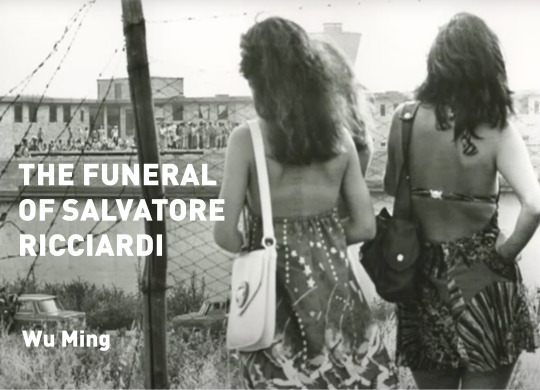
THE FUNERAL OF SALVATORE RICCIARDI: Celebrating a friend and comrade, while taking over public space again
WU MING

A final farewell to Salvo, to the songs of Su, communists of the capital! "This rebellious city, never tamed by ruins and bombings…"
Of all the measures taken during this emergency, the ban on funeral services is among the most dehumanizing.
In the name of what idea of "life" have these measures been taken? In the prevailing rhetoric of these past few weeks, life has been reduced almost entirely to the survival of the body, to the detriment of any other dimension of it. In this there is a very strong thanatophobic connotation (from the Greek Thanatos, or death), a morbid fear of dying.
Thanatophobia has permeated our society for decades. Already in 1975, the historian Philippe Ariès, in his landmark History of Death in the West, noted that death, in capitalist societies, had been "domesticated", bureaucratized, partly deritualized and separated as much as possible from the living, in order to "spare [...] society the disturbance and too strong emotion" of dying, and maintain the idea that life "is always happy, or at least must always look like it”.
To this end, he continues, it was strategic "to shift the site where we die. We no longer die at home, among family members, we die at the hospital, alone [...] because it has become inconvenient to die at home". Society, he said, must "realize as little as possible that death has occurred". This is why many rituals related to dying are now considered embarrassing and in a phase of disuse.
Even before the state of emergency we are experiencing, the rituality of dying had been reduced to a minimum. That is why we have always been so impressed by the manifestations of its re-emergence. Think of the worldwide success of a film like The Barbarian Invasions by Denys Arcand.
Forty-five years ago, Ariès wrote: "no one has the strength or patience to wait for weeks for a moment [death, Editor's note] that has lost its meaning". And what does the 2003 Canadian film depict if not a group of people waiting for weeks - in a context of conviviality and re-emerging secular rituality - the passing of a friend?
Eight years ago we undertook, together with many others, to set up an environment of conviviality and secular rituality around a dear friend and companion, Stefano Tassinari, in the weeks leading up to his death and in the ceremonies that followed. Much of our questioning on this subject dates back to that time.
If the rituality linked to dying was already reduced to a minimum, the ban on attending the funeral of a loved one had finally annihilated it.
Back on March 25th we shared a beautiful letter from a parish priest from Reggio, Don Paolo Tondelli, who was dismayed at the scenes he had to witness:
"And so I find myself standing in front of the cemetery, with three children of a widowed mother who died alone at the hospital because the present situation does not allow for the assistance of the sick. They cannot enter the cemetery, the measures adopted do not allow it. So they cry: they couldn't say goodbye to their mother when she gave up living, they can't say goodbye to her even now while she is being buried. We stop at the cemetery gate, in the street, I am bitter and angry inside, I have a strong thought: even a dog is not taken to the grave like this. I think we have exaggerated for a moment in applying the rules in this way, we are witnessing a dehumanization of essential moments in the life of every person; as a Christian, as a citizen I cannot remain silent [...] I say to myself: we are trying to defend life, but we are running the risk of not conserving the mystery that is so closely linked to it".
This "mystery" is not the exclusive prerogative of the Christian faith nor of those possessing a religious sensibility, since it does not necessarily coincide with the belief in the immortal soul or anything else, but something that we all ask ourselves, when we ask, 'what does it mean to live?' 'What distinguishes living from merely moving on or simply not dying?
That said, those who are believers and observers have experienced the suspension of ritual ceremonies - including funeral masses - as an attack on their form of life. It is no coincidence that among the examples of clandestine organization that we have heard about these days, there is the catacombal continuation of Christian public life.
We have direct evidence that in many parishes the faithful continued to attend mass, despite the signs on the doors saying they were suspended. One finds the "hard core" of the parishioners in the refectory of the convent, or in the rectory, or in the sacristy and in some cases in the church. Twenty, thirty people, summoned by word of mouth. In particular last Thursday, for the Missa in coena Domini.
The same can be said of funerals. In this case as well we have direct testimonies of priests who officiated small rites, with close family members, without publicity.
In the past few days, we have identified three types of disobedience to some of the stupidest and most inhumane features of the lock-down.
Individual disobedience
The individual gesture is often invisible but occasionally it is showy, as in the case of that runner on the deserted beach of Pescara, hunted by security guards for no reason that has any epidemiological basis. The video went viral, and had the effect of demonstrating the absurdity of certain rules and their obtuse application.

Continuing to run was, objectively and in its outcome, a very effective performance, an action of resistance and "conflictual theatre". Continuing to run distinguishes qualitatively that episode from the many others which offer "only" further evidence of repression. As Luigi Chiarella "Yamunin" wrote, the video brings to mind,
"a passage from Crowds and Power by Elias Canetti on grasping, which is indeed a gesture of the hand but also and above all is 'the decisive act of power where it manifests itself in the most evident way, from the most remote times, among animals and among men'. Later, he adds - and here comes the part pertinent to the episode of the runner - that 'there is nevertheless a second powerful gesture, certainly no less essential even if not so radiant. Sometimes one forgets, under the grandiose impression aroused by grasping, the existence of a parallel and almost equally important action: not letting oneself be grasped". The video [...] reminded me how powerful and liberating it is not to let yourself be caught. Then I don't forget that if you run away you do it to come back with new weapons, but in the meantime you must not let yourself be grabbed."
Clandestine group disobedience
These are the practices of the parishioners who organize themselves to go to mass on the sly, of the family members of a dearly departed person who agree with the parish priest to officiate a funeral rite... but also of the groups who continue in one way or another to hold meetings, of the bands who continue to rehearse, and of the parents who organize themselves together with a teacher to retrieve their children's school books. It's an episode that happened in a city in Emilia, which we recounted a few days ago.
In order to retrieve the books from a first grade school that had been left at school for the last month, a teacher came to the school, took the books out hidden in a shopping cart, and entrusted them to two parents who live near a baker and a convenience store respectively, so that the other parents could go and pick them up with the "cover" of buying groceries, avoiding possible fines. The books were given to the individual parents by lowering them with a rope from a small balcony and stuffed into shopping bags or between loaves of bread, as if they were hand grenades for the Resistance. In this way those children will at least be able to follow the program on the book with the teacher in tele-education, and the parents will be able to have support for the inevitable homeschooling.
After a phase of shock in which unconditional obedience and mutual guilt prevailed, sectors of civil society - and even "interzone" between institutions and civil society - are reorganizing themselves "in hiding". In this reorganization it is implicit that certain restrictions are considered incongruous, irrational, indiscriminately punitive.
Furthermore: at the beginning of the emergency, parental chats were, in general, among the worst hotbeds of panic, culture of suspicion, toxic voice messages, calls for denunciation. The fact that now some of them are also being used to circumvent delusional prohibitions - why shouldn't a teacher be able to retrieve the textbooks left in the classroom? why should a dad or a mom have to resort to subterfuge, self-certification, etc. to retrieve those books? - is yet another proof that the "mood" has changed.
Provocative group disobedience
The performance of the trio from Rimini - a man and two women - who had sex in public places and put the videos online, accompanied with insults hurled at the police, is part of this rarefied case history.
The police have since held a grudge against the case, as exemplified by their official social channels.
The only thing missing from this catalog of disobedience is, of course...
Claimed group disobedience
Here we have in mind visible, and no longer merely clandestine collective disobedience.
For a moment we feared that the fascists would be the first to bring it into play. Forza Nuova attempted to leverage the dismay of believers in the prospect of an Easter “behind closed doors,” and without the Via Crucis. However, when leaflets circulated calling for a procession to St. Peter's Basilica tomorrow (Sunday 4.12), accompanied by mottos such as "In hoc signo vinces" and "Rome will not know an Easter without Christ", they were dismayed to find that it wasn't the Fascists who were behind them. Instead, it was our comrades and friends from Radio Onda Rossa and the Roman liberatory movement who, this morning, in S. Lorenzo, greeted Salvatore Ricciardi with what in effect became the first political demonstration in the streets since the beginning of the emergency.
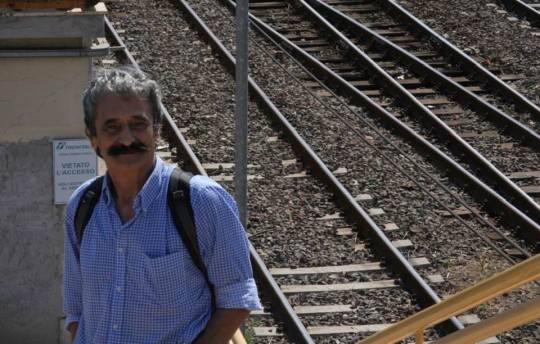
Salvatore Ricciardi, 80 years old, was a pillar of the Roman antagonist left. A former political prisoner, for many years he was involved in fights inside prisons and against prison conditions. He did so in a number of books and countless broadcasts on Radio Onda Rossa, which yesterday dedicated a moving four-hour live special to him. He continued to do so until even a few days ago, on his blog Contromaelstrom, writing about imprisonment and coronavirus.
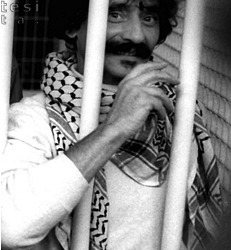
Headlines about this morning's events can already be read in the mainstream press. A precise chronicle, accompanied by some valuable remarks, can be heard in this phone call from an editor of Radio Onda Rossa [here]. Among other things, our comrade points out: "here there are rows of people standing in front of the butchers shop for days and days, yet we cannot even bid farewell to the dead? [...] We're in the open air, while in Rome there's not even a requirement to wear a mask and yet many people had masks, and there were only a few people anyway"...Yet the police still threatened to use a water cannon to disperse a funeral ritual. The part of the district where the seditious gathering took place was closed and those present were detained by police.
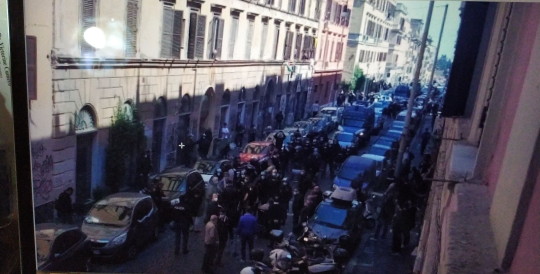
During this emergency, we’ve seen so many surreal scenes - today, to offer just one example, a helicopter took to the sky, wasting palates of public money, in pursuit of a single citizen walking on a Sicilian beach - and even still, this morning's apex had not yet been reached.
For our part, we say kudos and solidarity to those who run, and are out running great risks to claim their right to live together - in public space that they have always crossed with their bodies and filled with their lives - out of pain and mourning for the loss of Salvo, but also out of happiness for having had him as a friend and companion.
"Because the bodies will return to occupy the streets. Because without the bodies there is no Liberation."
That's what we were writing yesterday, taking up the “Song of el-'Aqila Camp”. We reaffirm our belief that it will happen. And the government fears it too: is it by chance that just today Minister Lamorgese warned against "hotbeds of extremist speech"?
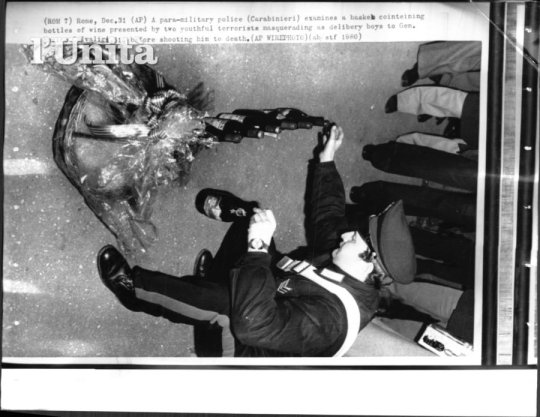
In her telephone interview, the Radio Onda Rossa editor says that the current situation, in essence, could last a year and a half. Those in power would like it to be a year and a half without the possibility of protest. They are prepared to use health regulations to prevent collective protests and struggles. Managing the recession with sub iudice civil rights is ideal for those in power.
It is right to disobey absurd rules
We should point out once again that, whilst keeping a population under house arrest, while prohibiting funerals, and de jure or de facto preventing anyone from taking a breath of fresh air - which is almost a unique phenomenon in the West, since only Spain follows us on this - and while shaming individual conduct like jogging, going out "for no reason", or shopping "too many times"...while this whole little spectacle is going on, Italy remains the European country with the highest COVID-19 mortality rate. Good peace of mind for those who spoke of an "Italian model" to be imitated by other countries.
Who is responsible for such a debacle? It is not a hard question to answer: it was the people who did not establish a medical cordon around Alzano and Nembro in time, because the owner asked them not to; it was those who spread infection in hospitals through an impressive series of negligent decisions; those who turned RSAs and nursing homes into places of mass coronavirus death; and lastly, those who, while all this was happening, diverted public attention toward nonsense and harmless behavior, while pointing the finger at scapegoats. This was blameworthy, even criminal behavior.
Everywhere in the world the coronavirus emergency has presented a golden opportunity to restrict the spaces of freedom, settle accounts with unwelcome social movements, profit from the behavior to which the population is forced, and restructure to the detriment of the weakest.
Italy adds to all this its standard surfeit of irrational ravings. The exceptionality of our "model" of emergency management lies in its complete overturning of scientific logic. For it is one thing to impose - for good (Sweden) or for bad (another country at random) - physical distancing as a necessary measure to reduce the possibility of contagion; it is quite another to lock the population in their homes and prevent them from leaving except for reasons verified by police authorities. The jump from one to the other imposed itself alongside the idea - also unfounded - that one is safe from the virus while "indoors", whereas "outdoors" one is in danger.
Everything we know about this virus tells us exactly the opposite, namely that the chances of contracting it in the open air are lower, and if you keep your distance even almost zero, compared to indoors. On the basis of this self-evidence, the vast majority of countries affected by the pandemic not only did not consider it necessary to prevent people from going out into the open air generally, as they did in France, but in some cases even advised against it.
In Italy, this radius is, at best, two hundred meters from home, but there are municipalities and regions that have reduced it to zero meters. For those who live in the city, such a radius is easily equivalent to half a block of asphalt roads, which are much more crowded than in the open space outside the city, if it could be reached. For those who live in the countryside, however, or in sparsely populated areas, a radius of two hundred meters is equally absurd, since the probability of meeting someone and having to approach them is infinitely lower than in an urban center.
Not only that: we have seen that very few countries have introduced the obligation to justify their presence outdoors by authorizations, certificates, and receipts, even calculating the distance from home using Google Maps. This is also an important step: it means putting citizens at the mercy of law enforcement agencies.
We have recorded cases of hypertensive people, with a medical prescription recommending daily exercise for health reasons, fined €500; or people fined because they were walking with their pregnant partner, to whom the doctor had recommended walking. The list of abuses and idiocies would be long, and one may consult our website for further examples.
Legal uncertainty, the arbitrariness of police forces, the illogical limitation of behavior that presents no danger to anyone, are all essential elements of the police state.
Having to respect an illogical, irrational norm is the exercise of obedience and submission par excellence.
It will never be "too soon" to rebel against such obligations.
It must be done, before it’s too late.
Translated by Ill Will Editions
33 notes
·
View notes
Text
Encounter
Words: 2,6K
Pairing: Jin x Reader
Genre: Fluff, Slice of life, Stranger to lover (?)
Summary: You will never know when and where love comes to you. Moreover when it comes from a perfect man that everyone adores.
Note: I’m surprised myself when writing this short fic of Jin. I didn’t expect the story to be like this haha. I write this for Jin’s birthday which is next week!!! And this is my first time to write after a looooong time so I hope it’s not too awkward.
Dani: Are you free today?
The very first message I check in the morning comes from my best friend. I make sure that today is Saturday before I send a reply.
Me: Yeah. Why?
Dani: I bet you haven’t check the group chat yet. Seonho asks us to meet today, reunion with hidden agenda I guess.
I open an active group chat consists of my high school friends. We actually don’t talk often but we always give each others’ updates to maintain good relationship. I scroll a little bit because everyone is sending message. When I see a picture, I finally understand the hidden agenda Dani’s told me just now. Seonho is getting married. Seonho, my biggest crush during high school.
**
“Are you coming?” Seokyung & Dani are on the way to the café. Some of friends will meet today, for the sake of reunion, and for early celebration of Seonho’s wedding. These girls have been my up and down when trying my best to keep my secret crush hidden. I’ve said to them many times that the silly crush is gone now, but I can’t lie that something does feel strange. And now they unnecessary worry about me.
“Of course. Call me again when you arrive, I’m at the nearby park.”
“Going out with your camera again?”
“Yes. I don’t want to waste a good day like this”
“Okay. Don’t stay under the sun too long”
I walk around the park, following the line of trees. It’s getting warmer as welcoming spring season but sometime the wind is still too cold for me. I take some pictures when find something that catch my eyes. It’s always entertaining to watch people’s interaction. I often sit alone and enjoy the breeze. It helps me clearing my mind when days feel too rough. Sometimes, I get bonus to see beautiful faces for my camera to catch. Just like that one particular man who just walks out from the café. He must be model or actor to have that gorgeous face and perfect proportion.
I take few pictures of him. I know they will turn out good even though I don’t take its properly. It’s surely not because I’m a good photographer but the object. It makes me smile. It will be nice to get this kind of pictures every time I shoot.
*Dani calling*
It’s time to be back to reality.

I make a promise earlier that whatever happened today it won’t break me down, not again. I might like him in the past but it’s all in the past. He will forever see me as a friend and I know that from the very start. I know it well. But it’s just I get a closure that I needed today when I get his wedding invitation. I can hold it well in front of him and my friends. But somehow, a tear escapes from my eye.
I look at the film camera I bring today. I want to make memories with them, with Seonho too, using his camera so I cannot have second thought after the photo taken and delete it. This should be one of ways for me to toughen myself and be true to my own words. I’ve done liking Seonho and only see him as a friend.
I still have 5 frames to go. I take a deep breath and snap a shot of the upper part of the building together with the clear sky. Long sigh comes out, I really don’t want to cry but it keeps falling.
“Are you okay?” asks a man from a bench away. It startles me and surprisingly stops me from crying.
“I know it’s not my business but I think you need this” says the man who is standing a step away. I look at him while wiping the tear stain.
“I’m fine”
“I just purchase it from the vending machine if you don’t believe me. I don’t have any bad intention. I just feel bad to see you sad and this sweet drink should make you a little bit better”
He is very good looking. No, extremely handsome. He surely has his way with words but I still keep my guard up. These days, many criminals disguise as kind looking or educated person.
“You can take a picture of me as proof later on, if I really do something bad to you”
He, once again, push the cold drink to me and back to his bench again. He opens his bottle and drink it like a commercial. I can’t help a small smile when see him do that. He is surely a weird guy.
“I’m ready to pose if you really want to take a picture though”
“Okay, just in case”
I bring my film camera to my eyes and capture a very clear shape of his face.
“One more with your phone. You can send it to your friend ‘just in case’ I steal your phone later” he says while striking another pose. I shake my head. I do not expect laughing at the very moment.
I fulfill his request to take his picture with my phone camera and show him the result. I really hope he is not a bad guy because it will be a shame for his beautiful face and such a wit.
“Thank you” I say to him before drinking. My heart feels a little bit lighter than earlier.
“Will you post you pictures online? Hmm maybe on instagram?”
“I don’t know”
“I give a permission to post my pictures on your page then, no need to thank me”
I laugh for the second time. This time he laughs with me. Why someone bother to stop, spend his time for a poor looking stranger and make her laugh? I mean, we are strangers, we don’t know each other, less care for each other.
He, now, moves to my bench and sit on the other edge.
“I’m Seokjin, you can call me Jin. You can to not tell me your name now, but do me a favor”
“What is it?”
“When I find you, I mean my picture on your SNS, you cannot decline my offer for coffee or dinner if you don’t drink coffee”
“Okay”
“Be prepare for our second date” he says before leaving me all smiley on the park.
When he’s far enough from my sight, I just realize. He’s the man I saw this afternoon. The living sculpture that makes my pictures look better. I shake my head in disbelief. I’m expecting our next meeting to come.

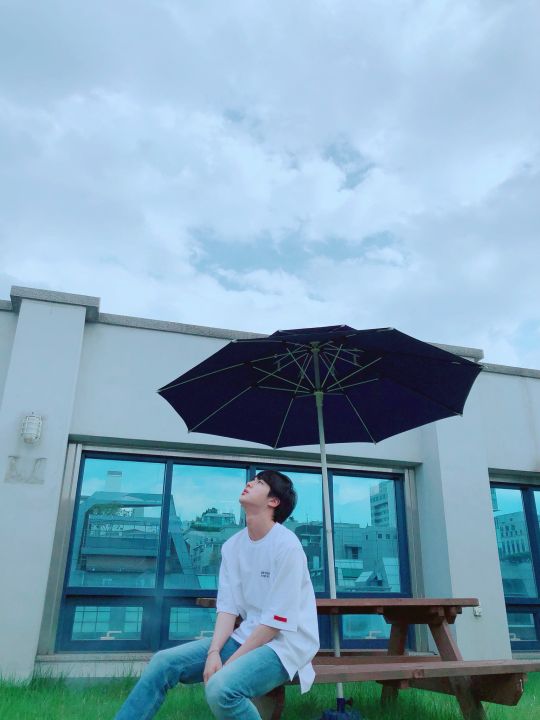
10/10
This is the last picture of my happiness project. A pleasant encounter. Thank you.
seonho__kim Oh? Who’s this? You hide your new boyfriend from me?
kyungie_SK YOU MEET HANDSOME MAN IN SECRET!? WHATTA BESTFRIEND!!
DDDani is he… Jin sunbae? You two ...?
KSJin92 I cant tell which one is better, the photographer or the model, should we discuss it over a coffee? Or dinner? Your call.
The minute after I post Seokjin picture, everyone’s being wild. My bestfriends are being so loud on our private group chat. Sending all text in capital letters, sending all threating meme stocks they have on their phone. They demand me to explain in details how, when, why regarding Seokjin. I have to ignore those texts as I have to back to work. I know once I start replying them, they will never let me to stop until they satisfied. I receive DM notification from the source of this phenomenon right before I out it back to my pocket.
Jin: I know I offer coffee or dinner, but I wait for a long time just for coffee.. I know this Japanese restaurant that has superb menu and deserves all those Michelin star, so… will you be free on tomorrow?
Me: That sounds very promising and I have no reason to refuse, don’t I?
Jin: Great. 010 XXX XXXX This is my number, text me your office address and I’ll pick you up. See you soon ;)
Right after works, Seokyung and Dani ask me to meet them in chicken restaurant near our highschool. It’s our favorite restaurant to go whenever we want to fulfill our stomach while gossiping.
“I don’t believe how small this world is. How can you and Jin sunbae meet? He is ‘the sunbae’ I told you guys before” Dani seems excited and amazed at the same time. Dani works at the finance consulting company for 2 years now and Seokjin is his senior in different department.
“The famous sunbae?” ask Seokyung. Dani nods quickly. Me and Seokyung remember how Dani describe this man to us the first week she got the job. The idol of her company, who has many admirers from intern to senior staffs.
“I met him at the park last time, we talked a little and he asked me to take his picture”
“But how? And why?”
That’s exactly my questions too. Compared to him, I’m just an average looking woman, and a stranger. He must have work with many beautiful women in daily. I shrug my shoulder to answer them.
“It just happened”
“Is he a weirdo? I know he is handsome, but it doesn’t mean he is a good guy” Seokyung states her opinion with doubtful face.
“He. Is. The. Perfect. Guy” Dani says.
“He is very kind to others, well-mannered and smart. He is professional at work, no matter how friendly he is, he will be strict to those who make mistakes. During our company’s dinner, he can make everyone’s laugh with his dad jokes. I don’t think you can fake that one, no?”
“So… it will be fine if I meet him again, right?” ask me to both of my bestfriends.
“Totally fine”
“I think so”
They answer at the same time. They look at each other and laugh.
“That’s the fastest answer I ever heard from you too”
“I wish you to have boyfriend for what.. 2 years? It’s the perfect time to start again, you know” said Dani with a smile.
I’ve tried to have romantic relationship with other men before this but it never stays long. I was happy with them, everything goes smoothly. However, at some points, we both know that I cannot love them like they love me.
“Do you think it will work out this time, with Seokjin?”
“We won’t know for sure, but we wish you to be happy”
I also wish myself to be happy, happier.

Spending time with Jin is always entertaining. He knows his choice of words will lighten up the mood between us whenever we’re going out. He never seems out of topic or makes me losing interest. When I talk, he will attentively listen. Most of times he introduces me to all of his favorite restaurants in the city. Sometimes, he will accompany me taking pictures for my new projects. We just feel very comfortable to have each other around.
“Have you tried the new ice cream parlor near your home?”
“I haven’t tried it yet but I heard it’s good. They also have opening promos this week, if I’m not mistaken”
“Then should we go there before I drop you?”
“Hmm… are you making me join your morning jogging tomorrow?”
“You can read my mind so well. I need to make an excuse so I can meet you tomorrow morning”
I hold my smile and turn my face to the window.
“Who’s taking a woman eating ice cream nearly 9 pm”
Seokjin laughs a loud. He puts the ice cream parlor’s address to his car’s GPS despite of my comment because he knows I won’t survive the temptation.
“I will let you eat the mint-choco flavor this time. How about that?”
I pretend to think for a while. We both know Jin will get what he wants, but I just want to make it looks like not too easy. I don’t want to look I like him more than I should. Considering he let me to buy mint-choco flavor after countless dates for ice cream, he must really want us to go there. He always stops me when I want to pick that particular flavor and suggest me all of other flavors before.
“Bonus. How about dinner at my place next week? I’ll show you how good I am in kitchen”
I know he doesn’t have hidden meaning in his words but I can’t help to blush. He shouldn’t know how many times I imagining to hug him. He has wide shoulder and tiny waist, deep soothing smell and a good amounts sweet talks. We always an inch away to kiss. It makes me somewhat impatient and wondering how it feels like.
“O..okay”
“Cute”
We don’t label our relationship but we are no longer stopping ourselves to touch each other with affection months ago. This time feels different from the other relationships I have before. I trust Jin from the beginning and I think I fall in love with him sooner than I expected. He, himself, is very different from men I met before but I never thought we will match very well. To be honest, I thought he’ll only play around with me. But he always proves me wrong with his actions.

Dinner at his place become a routine. He doesn’t cook every time I come over, but never let me disappointed by his chosen take-out menu. Sometimes he just wants us to watch movies with snacks. The first three dinners, he will drive me home even it’s late. But after that, he will pretend too sleepy and persuade me to sleep over. It’s not I don’t like it, but he just tortures me more than before. These days, he will just hug me once I step inside his place and won’t even let me go for more than 5 minutes. It feels like we put ourselves in internal battle, to see who stands longer in this sexual tension.
“You’re not going home tonight” he said.
“I know” I answer without looking at him.
I give up to try right after the first night I fail to force him getting up while pretend to be sleepy. I remember how cheerful he sounds when I agree to sleep over. He even let me wear his favorite green pajamas.
He pulls me closer to him till my back fully leans to his chest.
“Should I tell you my plan tonight or you already know too?”
“Hmm? What plan?”
“I call it ‘Making You Mine’ plan?”
“Making me yours?” I ask. I turn my face to see him and find him already looking at me.
We just stare to each other’s eyes for some good seconds until his eyes start to travel down. He stops at my lips and wetting his own lips. I can’t help to notice how his tongue move slowly.
“Yes. I’ll make you mine tonight” he whispers while looking back at my eyes.
My mind blanks. I can’t think other things than his lips, his body, just himself in front of me. His face comes closer and I close my eyes when I feel his soft thick lips on mine. I hold onto his arm that circles my waist.
“I forget to tell you. You’re not going to sleep either”
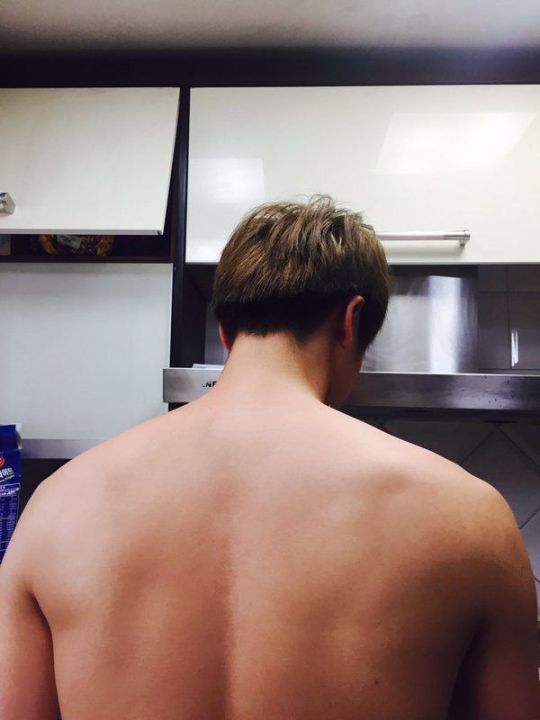
The perks of having best photographer in the world as your girlfriend ;)
By @.Y/N
Y/N OMG. WHY DO YOU POST THIS?!
KSJin92 @.Y/N you’re the only one who can capture my beauty, honey, I have to show it to the world
Y/N @.KSJin92 tell me why I agree being your gf again
KSJin92 @.Y/N oh you know why… should I list all of them here? ;)
DDDani @.kyungie_SK this is why she was busy for the weekend ;)
kyungie_SK @.DDDani totally understand lol
Y/N @.DDDani @.kyungie_SK shut up you two!!!
#bts fics#bts fic#bts fanfics#bts drabble#bts x reader#bts jin#jin x reader#jin fanfic#seokjin fanfic#bangtan fanfic#bts fluff#happybirthdayjin
3 notes
·
View notes
Text
On Hillary...

It seems to me that one of the most obvious statements of the 21st Century is that Hillary Rodham Clinton is a divisive figure. But to unpick this divisiveness raises many questions, and cracks open the tides of contradictions that swell within the Hillary discourse. Nanette Burstein’s new four-part documentary Hillary (available on Sky in the UK) goes a long way to capture what makes HRC such a compelling figure, someone who seems to be at once ‘ahead of her time’ and behind the times. The documentary is structured in a way that offers glimpses of her 2016 presidential campaign woven through a chronological telling of her early years; Bill Clintons’ gubernatorial and presidential campaigns; her role as First Lady; her tenures as senator for New York and Secretary of State; and, her ultimately unsuccessful presidential campaign.
I really should say that I have long been a fan of Hillary. I’m not objective (who is?). I find her inspiring, funny, charming, endearing, and yes, likeable. I know these statements alone will raise the ire of many, and perhaps justifiably so. Hillary, like many politicians, straddles a very tricky chasm – one’s personality and persona as a living feeling person, and their role(s) in global political decisions which adversely impact many people. Part of what makes Hillary such a complicated figure to explore is the way her life is a metaphor for so much. She is so many things to so many people: feminist hero, political maverick, betrayed wife, knowing accomplice, hard-nosed career woman, corrupt career politician, dedicated public servant, and the list goes on. The point I find interesting, that I really want to capture, and that Burstein’s film settles into is the fraught relationship between Hillarys’ role in history and her role in the present.

The ways in which we can observe generational, social, and historical changes through the stages of Hillary’s life (as well as observe how Hillary herself played an instrumental role in shaping American consensus, and dissent, on many of these very topics) reveals much of what makes Hillary’s legacy so complex. Hillary is in the unique position of being both one of the many women who lived these changes, as well as having the public notoriety and fame to be a ‘historical context map’ for these changes. Her persistence to not exist in history makes her very difficult to grapple with. We are used to exceptional woman who shaped history, remaining just that – figures in history. We are less accustomed to these women continuing to live their compelling lives publicly and presently, and with little regard for their detractors. It is often easier to view problematic figures more favourably in retrospect, one wonders if the temptations to view them more harshly in present tense is also true? Maybe not, but it’s an interesting thought in Hillary’s case. Whether said outright or not, I think a reason behind much of the venom directed at Hillary is a response to the ingrained, implicit bias we (read western, specifically American) as a culture have for women who demand to be heard, and not only that, but women who have the audacity to want to lead – to desire to build, shape, and remake the very apparatus through which voices are heard and decisions are made.
As Burstein’s documentary shows, Hillary did forge paths (alongside a sea of exceptional women). However, the course of Hillary’s life pushed her to the front line in terms of exposure. I am not blaming internet culture, social media, and advances in technology and news media for the problems Hillary faces. But I do think there is something to be said for the inadequate ways in which we can incorporate the past of someone’s life into their present endeavours. Burstein captures so clearly this tricky paradigm – Hillary spent the better part of two decades navigating attacks that painted her as ruthlessly politically liberal and radically feminist (effigies of her were burnt), to then have to spend the most recent tenure of public life proving herself as liberal enough, feminist enough. As the final episode suggests in its title “Be our champion, Go away”, Hillary faces a unique problem (possibly created through such a protracted time in the public eye, and a determination to continue to rise higher): she doesn’t fit well in the current media discourse. The vastness, and notoriousness, of her history seems too unwieldy to be handled in a consumable way that allows her to not just represent the past but also play a role in the future.
Burstein’s documentary highlighted another specific problem Hillary faces – the perception of herself as false, scripted and performed. For instance, at their rallies both Bernie Sanders and Trump scream, shout, their voices course and determined. The documentary, nor Hillary make this defence, but it is clear through so many micro-aggressions and misogynistic rebukes that Hillary (like so many female leaders) is not permitted the same performance of anger and frustration as her male political counterparts. Hillary has to moderate her performance in ways others simply don’t. It seems the consequence of this male/female double standard is the view of Hillary as false. Hillary’s own team highlight her apparent ‘lack’ with public speaking. Hillary herself remarks that her relationship with the press and public was inevitably worn down as a result of years of media controversies.[1] Her awareness that she will be attacked for a raised voice or spontaneously chosen word cannot not have an impact of her public performance, and as such its reception by the audience. In a scene from the documentary one of Clintons aides describes how one of Hillary’s biggest strengths is also her biggest weakness. He uses her vast knowledge of policy as both a pro and a con. He gives the example of healthcare. During debates when Bernie and Hillary are asked about healthcare, Bernie’s response may be ‘free for all” and “universal”, whereas Hillary’s response may be a twenty-sentence-long description of her healthcare policy that she knows inside and out. A policy formed with the knowledge of how difficult it is to pass legislation. But this doesn’t read as well.

This brings us to one of Hilary’s biggest problems, her pragmaticism. This pragmaticism is also noted when a young woman attending a rally asks Hillary if elected president would she ban fracking. Hillary replies ‘No I would not do that. A president can’t just ban fracking, that’s not how our system works”. These moments typify a problem with Hillary. In the current media landscape, adoration for leaders not always based on articulated policy comes a misunderstanding of how certain legislative systems work (which is not a defence of these systems). One could argue there isn’t much difference between Bernie Sanders blanket commitments to bans, and Donald Trump’s executive orders. Yes, their intentions, and ideological views, are entirely different, but the ideal that any political leader is the fixer of all is shared, it seems, by both the right and the left. In 2020, and indeed 2016, Hillary’s pragmaticism was never a positive. I am trying hard not to make this a Hillary vs Bernie debate. I’m not a fan of Bernie (and that’s fine), I think his 2016 and 2020 campaigns did a great deal of damage[2], not just to Hilary’s chances of beating Trump after she secured the democratic nomination, but also to political discourse in general. But that is a debate for another time.

I think Hillary will be a difficult watch for people who feel they are aware of her political leanings and regard her as a war-monger, bought-and-paid-for corrupt politician and Wall Street conduit. The documentary does defend some of these charges, but it doesn’t fully engage with Clinton’s political choices, especially on foreign policy and her tenure as Secretary of State under President Obama’s administration. Hillary’s ideologies, while not uncommon in the American political landscape, are observed with a different rigour, and tone, compared to her male counterparts (Obama, Bill Clinton, Joe Biden etc). Hillary, according to media discourse and online opinion is something of a war hawk[3]. Burstein’s documentary doesn’t spar with Clinton’s policy stances. It doesn’t explore her ideological viewpoints. It is focussed on her as a woman. It wants to paint as comprehensive a picture of Hillary as a woman, and how her life fits within a series of social and political changes throughout her more than three-decade role in public life, as possible. It of course goes without saying that politicians cannot be excused of their harmful decisions based on the fact we like them alone. I accept Hillary is a problematic figure. I also accept I am no expert. I have little comprehension of the global political challenges that underpin many political and military decisions. It is worth pointing out, not as a defence of Hillary per se, but rather as added context regarding the way gender is embedded in supposedly straightforward profiles, that decisions taken by President Obama are often laid at Clinton’s feet. The men who have supposed ‘good’ public images, like Obama, face less scrutiny than Hillary.[4] This brings us to a key point visited upon in Burstein’s documentary Hillary, and a woman’s, apparent need to defend, be complicit in, and take undue responsibility for, the actions of men.
The baggage of Bill Clinton’s affairs is never far from discourse on Hillary. Burstein’s documentary explores this and offers some critical insight into the ways in which women are exploited in media discussion in ways men are not. The requirements are different. This leaves Hillary in a difficult situation – on one hand she is at times defined by the men in her life (the media and public demanding her response and rationale), and on the other the actions of men are used against her, or as representative of her. It is a lose/lose double standard.

I suppose the root of Hillary’s issues is that she has lived life so publicly and with such a period of time that she has gone from being a scary liberal, to a right-of-centre moderate, without her views necessarily changing that much. Her pragmatic approach may not have changed, but the contexts surrounding it undoubtedly has. I’m unaware of many other western political figures who have enjoyed (although Hillary may choose a different word) such a duration of not only public notoriety, but also political influence, and power. There is such a gulf between who many see Hillary as (split into vociferous ‘for’ and ‘against’ camps) and who Hillary sees herself as. Ultimately, I think these conflicting ideas of Hilary are so firmly built that many won’t go near this documentary. I suspect it won’t persuade Hillary detractors, and it certainly won’t dissuade Hillary fans. It may, however, provide extra context for this compelling and clearly trailblazing figure. It might remind many, or indeed show for the first time, the remarkable achievements HRC made (and continues to make) throughout a lifetime of work. Even if it doesn’t provide enlightenment, it could calm the choppy waters surrounding the brand of Hillary Rodham Clinton, allowing for a brief moment an acknowledgement of her and towering achievements, and the determination and resilience that accompany them.
[1] Her ‘Tea and Cookies’ scandal a prominent example. https://qz.com/762881/the-blatantly-sexist-cookie-bake-off-that-has-haunted-hillary-clinton-for-two-decades-is-back/
[2] https://www.theguardian.com/us-news/commentisfree/2017/apr/03/the-destruction-of-hillary-clinton-sexism-sanders-and-the-millennial-feminists
https://www.wsj.com/articles/the-damage-bernies-hillary-bashing-may-do-1460995155
[3] https://foreignpolicy.com/2016/07/27/hillary-the-hawk-a-history-clinton-2016-military-intervention-libya-iraq-syria/
[4] https://www.nytimes.com/2016/04/24/magazine/how-hillary-clinton-became-a-hawk.html
#hillary clinton#doc#documentary#Film Review#review#criticism#hillary rodham clinton#us politics#documentary review
8 notes
·
View notes
Text
Comfort Films Challenge
Thank you to the wonderful @omnishambolichologram for tagging me as always in these fun activites :3 ^^ Also - sorry it’s taken me weeks to FINALLY post this!
Film are definitely my number one enjoyment in life along with watching television series (aside from the obvious of spending time with family and friends) and there are quite a few comfort films for me, so it’s going to be difficult to narrow down to only seven! I might have to be cheeky and add in a couple of special mentions hehe
And FYI some of these films might not be necessarily comforting, but they are in that they’re easy to watch so many times because I love them that much. This list probably won’t have all of my absolute favourites, but we shall see what my brain comes up with this time because it sometimes changes.
(I won’t be able to rate one more than the other as they’ll all be different kinds of films so I wouldn’t be able to necessarily say one is better than the other)
I’ve chosen these films based on not only how rewatchable they are, but also on their sheer brilliance as a whole in terms of cinematography, dialogue, cleverness and the acting... (and probably on how long I’ve known them and grown to love them everytime I watch them)
Note: I don’t own some of the gifs included in this post. Credit would go to them if I knew who they were but I’m making sure that I don’t take credit for the ones which aren’t mine.
Good Will Hunting (1997)
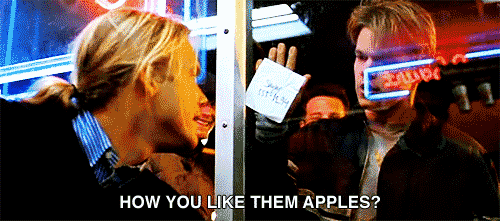
This film is quirky, intelligent, funny and teaches you a lot about the choices you make in life. I think what I love about this film is how simple the ending is. “I gotta see about a girl...” - sums up how love can end up being the most important thing to grab hold of when you realise you have it and never had it before. I personally believe that this is probably Matt Damon’s best performance out of all his acting roles even to this day. Ben Affleck and Robin Williams were pretty damn great in it too.
Midnight Run (1988)
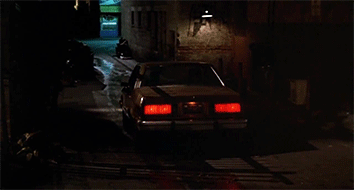
(This gif is mine).
This film has it all. A damn well cleverly written script with uncanny and hilarious dialogue, brilliant dynamic between the two main characters, fabulous music score, wonderful sets of shots (the cinematography of the beginning scene is great) and basically a simple story that is not only entertaining and easy to follow, but is acted out fabulously by everyone. The whole wild goose chase for these two men played by Robert De Niro and Charles Grodin across the country is just ridiculous, but ridiculously funny. I have to say that it’s definitely one of my top favourites of all time. If you want a laugh, I would recommend this one!
Special mention (another Martin Brest film): Beverly Hills Cop is on point also.
The Breakfast Club (1985)
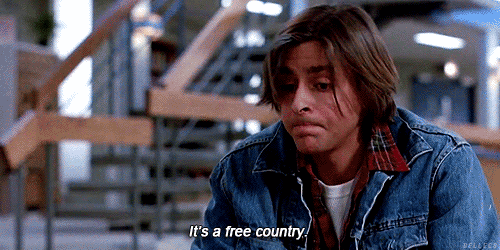
It was tough for me to just decide on one John Hughes film as he’s one of my favourite directors of all time, but I chose Breakfast Club because it’s the ultimate classic coming-of-age story, and it’s all set in just one location. It’s clever in that there doesn’t have to be lots of action to make it good, all it does is introduce a bunch of teenage stereotypes and take away the shields that they have put on and learn to no longer be prejudice of one another. Eighties is also my favourite era of films and this is just a perfect mixture of comedy and drama. The acting is great and I give applause to especially Judd Nelson and Anthony Michael-Hall for their delivery and their facial expressions.
Special mentions of other John Hughes films he has written/directed that I ADORE: Pretty in Pink (Andrew McCarthy and James Spader yum), Sixteen Candles (hilarious), Uncle Buck (the best family film ever), Planes, Trains and Automobiles and Some Kind of Wonderful <3
Heathers (1988)
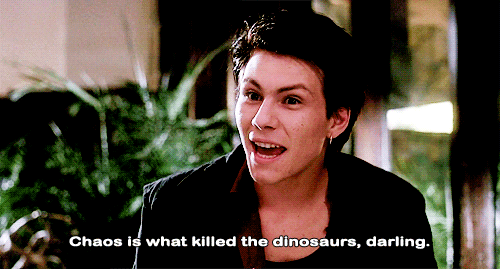
Christian Slater and Winona Ryder are the best duo in this film and it is another eighties classic. I related to both these characters and I can never get enough of this film. I have probably seen it twenty times or more and still not fed up with watching it. The dark comedy and the gritty and foul dialogue are iconic in this flick, and I take my hat off to the brilliant Heathers (Kim Walker - may she RIP, Shannen Doherty, Lisanne Falk) for playing such clever and awful characters. I was obsessed at one point with Slater because of his role as J.D and honestly his death at the end of the film is a powerful as fuck ending. The cinematography of the ending makes the film for sure, the angle, the chosen shots I just Ugh. Fabulous.
The Help (2011)

This film. I don’t know it’s just brilliantly done and the acting is perfection. Emma Stone, Viola Davis, Octavia Spencer, Jessica Chastain and Dallas Bryce-Howard are fantastic in their roles and this film explores such a crucial time period that I think is illustrated well. These women while fictional, feel so real and the struggle of black maids (black people in general really but this is specific to the women) is real. I cannot help but cry everytime at the ending, and the way that Aibilene stands up for herself, I never get tired of. It is easy to watch as it’s not painful like 12 Years A Slave, but it still epitomises the segregation that was so prominent in the sixties in southern US very well. I find comfort in how delightful the characters are and still manages to be funny despite the story being focused on such a sensitive subject.
The Shawshank Redemption (1994)

Shawshank, well we all know this film. It has been parodied and quoted so many bloody times, but yet I am cliche in love with it and I cannot fault a single thing about it. Tim Robbins is an underrated as fuck actor and he should be appreciated so much more for his stellar performance as Andy Dufrense. He is the epitome of the straight and narrow man who, really, is not a bad guy at all. In fact, he’s always tried to be the opposite. You symphathise with him throughout and you really feel his struggle, but also his perfect ability to be so human. He makes Red realise he is not as bad as he made himself believe and of course we know how good Morgan Freeman is. Again, this film like Heathers I could watch a million times and never get bored with it. Whether it’s on TV or I find it available online, I always will make time to watch it.
Call Me By Your Name (2017)
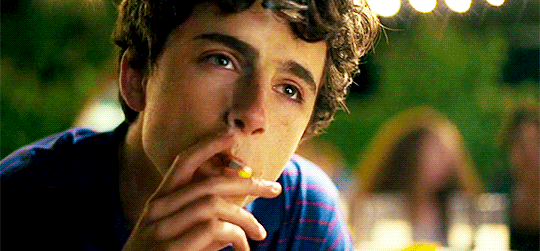
I have only recently come across this film about 8 months ago and it’s the kind of film which I can’t help but wonder where it’s been my whole life. I have already watched it probably like 10 times since I found it and I am so happy I did. However, it has led me to form an unhealthy obsession with Timothee Chalamet where he has come up in conversation in real life and I figured the only things I was still an avid fan of was of Supernatural and Red Dwarf, but no this film is just pure delightful dynamite. The cinematography is so elegant and perfect (especially during the dream like sequence when Elio is alone or in the gif above when Elio is watching Oliver). The screenplay brilliantly illustrates how wonderfully amazing but also torturous love can be, and well it is set in the eighties. What more can you love? Timmy and Armie have such good chemistry it’s unreal, and they make their characters so believable. Another film I cannot fault and could watch anytime, even though the ending is heartbreaking af.
Bonus: Bridget Jones’s Diary (2001)
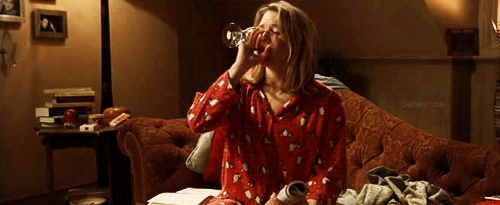
Notting Hill (1999)

About TIme (2013)
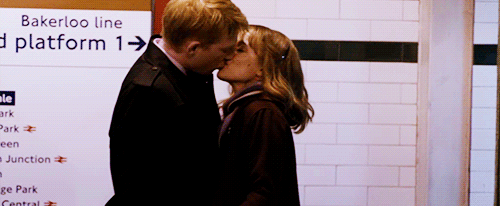
There are plenty of other comfort films I adore but it probably depends on my mood. I’m definitely a sucker for romantic comedies and these three are on here as bonuses because they’ve also been very comforting to me over the years. What can I say? Richard Curtis writes some brilliant screenplays and directs some of them too.
#comfort films#comfort films challenge#heathers#good will hunting#the shawshank redemption#call me by your name#the breakfast club#the help#midnight run#notting hill#bridget jones's diary#about time#cinema lover
7 notes
·
View notes
Text
Pride month has come and gone, but we are still here

Gif credit: @bisexualdonatello
I don’t talk about it very often (mostly because I am not officially out) but I’m bisexual. I am attracted to those who identify as my own gender (female) and those who identify as an opposing gender. It has taken a few years of rationalizing and actually sitting with myself to come to accept this. In fact, very recently I had contemplated the legitimacy of my sexuality again. This is due to a few things: I have never had a relationship of any kind, I live in a conservative community, and I am still learning about the terminology and culture that comes from the LGBTQA+ community as a whole. Popular media—visual media specifically—has been a great influence in this regard. The older I got, the more access I had. The more access I had, the more I was able to learn. I grew to have a better understanding of the world around me and could explain how and why the media I consumed resonated with me personally. It took a while, but this is how I got here:
Bi Awakening (Film)
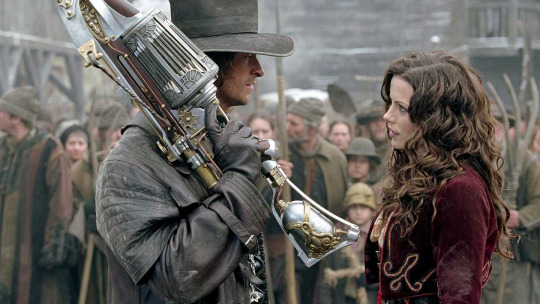
It was the late 00′s when I saw Van Helsing for the first time. I was immediately hooked. It has all the things I loved and still love to this day: monsters, a gothic aesthetic, an anti-hero with a heart of gold, bad-ass women who are immaculately dressed and fight hard, and a tragic ending. I had always been interested in Hugh Jackman ever since I watched him play Wolverine in the X-Men films. This character was what did it for me. Van Helsing was brave yet troubled. He had a knack for fighting evil and finding good where others couldn’t see it. This is a character I would daydream about going on long adventures around the world with. After watching the movie several times, my eyes also followed Anna Valerious, played by Kate Beckinsale. She was determined and a fighter through and through. Her skills and her dedication to her family drew me in. I wanted to hug her and fight monsters by her side. Oh, and did I mention they were both highly attractive? Because they are, just look at them, oh my gosh!! I took a while, but I finally admitted to myself that I like both men and women. Despite never acting on these feelings, I felt content with the conclusion I’d come to. This went on for a few years. It wasn’t until this year that I started questioning it all again.
Bi Confusion (YouTube)

I’ve watched my fair share of ContraPoints videos. In her video Shame, Natalie explains how she came to the conclusion that she is a lesbian. Throughout the video she explains how she was in a heterosexual relationship that, while loving and nice, was not fulfilling. She brings up the topic of compulsory heterosexuality, the feelings some women experience due to the norms of our society. I went in search of the “Am I a Lesbian” article mentioned in the video and read through the whole thing in one sitting. I came away from it feeling like I had unlocked some secret. Maybe I had been confused and conditioned all this time. Often my fantasies with women are more detailed and complex than my fantasies with men. That must mean I'd been avoiding one and embracing the other, right? And since I’ve never been in any kind of relationship, maybe I’d just been conditioned to include men in the equation from the start and couldn’t let it go? I had been entertaining a man I’d met online and had felt the relationship was forced on my end. Maybe I’m just not into men? After much consideration, I decided to give the lesbian label a try. That sounds horrible in retrospect, but I did it. I said the word to myself in private. I thought about spending my life pursuing only women. I excluding men from my fantasies. That didn’t last long. It just didn’t fit me. I learned through that exercise that my feelings for one gender don’t outweigh my feelings for another gender. The reason my fantasies vary is because of limited experience, not lack of interest. The reason I cut things off with the guy I’d been speaking with wasn’t because I was a lesbian, but because we just worked better as friends. I wasn’t a lesbian. I had just overthought my feelings. I’m attracted to people, not just their genders.
Bi Confirmation (Video Games)

My first exposure to Resident Evil was through several LP’s on YouTube. I have managed to play through a few games myself, though. The past few years have been really good for the Resident Evil franchise, the most noteworthy additions being the remake editions of Resident Evil 2 & 3. Leon’s a bad-ass super cop who just wants to do the right thing. Claire is an amazing person who cares so much about the people closest to her. Jill’s the most OP character in Resident Evil and just wants to save the world. Carlos is a genuinely good guy who wants to help. These people are heroic, bad-ass, and hot? Excuse me, I need a minute...Basically, I want to be these characters and be with them. I can confidently say that I am bisexual. There are other fictional characters I can point to that I would say affirm my sexuality—Casey Jones and April O’Neil from TMNT, Diana Prince and Steve Trevor from Wonder Woman, Markus from Detroit: Become Human, Harley Quinn from Birds of Prey—but Resident Evil has the most characters I love in a single franchise. When I was questioning my sexuality, I looked at these video game characters I had come to like and realized there was no denying myself. It’s okay to like both. Both is good.
Bi Acceptance (TikTok)

In conclusion, sexuality is weird. You might think you’re a young straight when all of a sudden you realize you find both a dashing monster hunter and a beautiful cursed princess attractive. Then, years later, you might watch a YouTube video that has you questioning yourself all over again, only to realize you are who you though you were after playing a game about fighting zombies. Basically, visual media helped me discover myself. But that’s not the end of it. I’ve found myself on TikTok a lot since the pandemic started. It’s nice seeing people in the LGBTQA+ community having fun and making the most of a shitty situation. I rediscovered Sarah Schauer, which was a nice surprise. Come to find out, she’s bisexual too. Seeing this community band together in times like these has been a heartening experience. So many positive vibes. There may be people out there who say you should only like one or another, or that being in a heterosexual relationship diminishes your sexuality, but those people are wrong. The bottom line is that you cannot tailor how you feel to fit the expectations of others. This post is kind of weird and out of nowhere, and a little very self centered, but I had to get this off my chest. This will likely never be read by anyone. However, if you are reading this and you have had a similarly weird experience, know that you are not alone. You may have just realized your feelings, you may have known for a long time, or you may still be trying to figure things out. That’s okay. Your feelings are valid. Your experience is valid. You are valid.
TL;DR Whenever I am questioning my sexuality I remember Resident Evil and I am at peace. Also through all this I’ve learned I have a type: bad-ass hero with a kind heart.
#bisexual#bisexuality#bi pride#pride#lgbtqa+#personal#fandom#van helsing#contrapoints#resident evil#hannah speaks
4 notes
·
View notes
Link
Taylor Swift on "Lover" and haters
John D'Amelio August 25, 2019
You might say Taylor Swift's happy place is at the piano in her Nashville home. "There have been so many songs that were written at this piano," she said.
"And it's often the middle of the night?" asked correspondent Tracy Smith.
"It's usually in the middle of the night," she replied. "Or if I'm trying to get to sleep and I can't and then I get an idea. And I'm, like, 'Well, I'm not tired anyway!' And then kind of wander over here."

Taylor Swift at her piano, with correspondent Tracy Smith.
It's kind of a rare sight, not just because "Sunday Morning" was there ("I haven't serenaded someone in a while, hope you know that!"), but because, for the moment, Taylor Swift was actually sitting still.
I promise that you'll never find another like Me-e-e, Ooh ooh ooh ooh I'm the only one of me Baby, that's the fun of me – "Me!" by Taylor Swift, Joel Little and Brendon Urie
And there never really has been another like Taylor Swift. After only 13 years in the business, she's become a musical force of nature, with an armload of #1 hits, more Grammy Awards than The Rolling Stones, and (according to Forbes) the distinction of being the highest-paid celebrity on the planet.
By any measure, she's an amazing young woman. But there were times, she says, that being young, and a woman, worked against her.
"You're always gonna have people going, 'Did she write all her own songs?'" she said. "Talking about your personal life, talking about your dating life.
"There's a different vocabulary for men and women in the music industry, right?"
"Gimme an example," asked correspondent Tracy Smith.
"Okay. A man does something, it's 'strategic'; a woman does the same thing, it's 'calculated.' A man is allowed to 'react'; a woman can only 'over-react.'"
And it seems her usual reaction is to get to work. Swift writes or co-writes all of her songs. And what's more, her music videos are all her vision, from the pastel wonderland in "Me!":
youtube
…to the giant dollhouse in her latest video, "Lover."
youtube
That's also the title of her critically-acclaimed new studio album, her seventh. She wrote "Lover" on her piano at home, and polished it up in the studio. And once she recorded the music, Swift (accompanied by and her cats) went to Hollywood to make the music video, and she invited Smith along to watch.
There's a love story here, and like a lot of Swift's work, it's an echo of her real life.
Born in Reading, Pennsylvania, Swift discovered her love for music as a toddler. She set her sights on a career in country music, and eventually her parents and younger brother moved to Nashville to help her do it.
"My brother's a real bro for doing that," Swift said.
"Yeah, they all upended their lives," Smith said.
"For sure."
"It worked out well!"
"Yeah, I buy 'em lots of presents," she laughed.
youtube
The rest reads like a fantasy: Swift became a country music phenomenon, and, in the last few years, a pop icon. But the superstar is, by her own admission, as emotionally fragile as any other 20-something, "I'm still someone who is the first to apologize when I'm wrong," she said. "But I think I'm better at standing up for myself when I've been wronged. So, that's something that I think also comes with growing up."
Which brings us to Scooter Braun. Earlier this summer, Braun, a talent agent with whom Swift says she has a contentious relationship, acquired the rights to her previous recordings – her masters – when his company bought Scott Borchetta's Big Machine Label Group for a reported $300 million. Borchetta, who worked with Swift for years, says she and those close to her (including her dad, who was an investor), knew about the deal in advance, and that Swift had previously been offered the chance to buy her own masters.
She remembers it differently, and told Smith she didn't see it coming: "I found out when it was online, like, when it hit the news."
"Nobody in your inner circle knew?" Smith asked.,
"Nobody knew."
"And you didn't smell it?"
"No. I knew he would sell my music; I knew he would do that. I couldn't believe who he sold it to, because we've had endless conversations about Scooter Braun. And he has 300 million reasons to conveniently forget those conversations."
With the sale of the masters to her first six albums, there has been speculation that Swift might re-record her back catalog, in order to control the recordings of her songs.
Smith asked, "Might you do that?"
"Oh, yeah," Swift replied.
"That's a plan?"
"Yeah, absolutely!"
Scooter Braun may not agree with her side of the story, but he did reach out to Swift in a tweet last week, calling her new album "brilliant."
It's clear that Swift wants to control her music: When it's time to release one of her new songs, she does it personally, talking to her fans live on Instagram. This personal connection has earned her a loyal following. But her openness comes at price: She's followed just about everywhere she goes these days, by people who are crazy about her – or just plain crazy.
Smith asked, "Where is home for you now?"
"It's a very good question," she said. "I try not to ever really say where I am the most, because since all my addresses are on the internet, people tend to show up uninvited. Like, you know, dudes that think we have an imaginary marriage."
"And you mentioned that you keep wound dressing with you?"
"Yeah. I've had a lot of stalkers show up to the house, armed. So, we have to think that way."
And she's come under attack in other ways: You need only glance at the tabloids to see some very well-publicized feuds, and she often hits back at her haters through her music. For instance, in "You Need to Calm Down," she calls out anti-gay protesters and online trolls:
You are somebody that we don't know But you're comin' at my friends like a missile Why are you mad? When you could be GLAAD? Sunshine on the street at the parade But you would rather be in the dark ages …
Control your urges to scream about all the people you hate 'Cause shade never made anybody less gay – "You Need to Calm Down" by Taylor Swift and Joel Little
youtube
Smith asked, "I'm curious, because I feel like almost every album, you have a song where you address the haters, at least one song. Sometimes more than one song."
"I probably do have that habit. I imagine that I might have that habit, yeah."
youtube
"Why is that? Why sing to the haters?"
"Well, when they stop coming for me, I will stop singing to them," Swift replied. "You know, people go on and on about, like, you have to forgive and forget to move past something. No, you don't. You don't have to forgive and you don't have to forget to move on. You can move on without any of those things happening. You just become indifferent, and then you move on."
"Do you believe in forgiveness?"
"Yes, absolutely, like, for people that are important in your life who have added, you know, who have enriched your life and made it better, and also there has been some struggle and some bad stuff, too. But I think that, you know, if something's toxic and it's only ever really been that, what are you gonna do?"
"Just move on?"
"Just move on. It's fine."
Taylor Swift's music is always personal, sometimes intensely so. "There's one song on the album called 'Soon You'll Get Better' that it's, I can't even really hear. I can't even listen to it."
She won't talk specifically about her inspiration, but it comes at a time when her mother Andrea, who was battling cancer, suffered a relapse.
Swift said, "It's really interesting because I don't think I have written a song quite like that before. And it's just sort of, like, it's just a tough one."
"I can imagine. But I can also tell you, having listened to it, that it's universal."
"It's just not something that we deal with until we have to, until we see it, until we experience it, until someone close to us is going through something like that. And so, writing about it was really emotional. And I'm just gonna stop talking about it now."
She's more comfortable plunging into her work. On the Hollywood set, a large glass tank will become a symbolic fish bowl in the "Lover" music video.
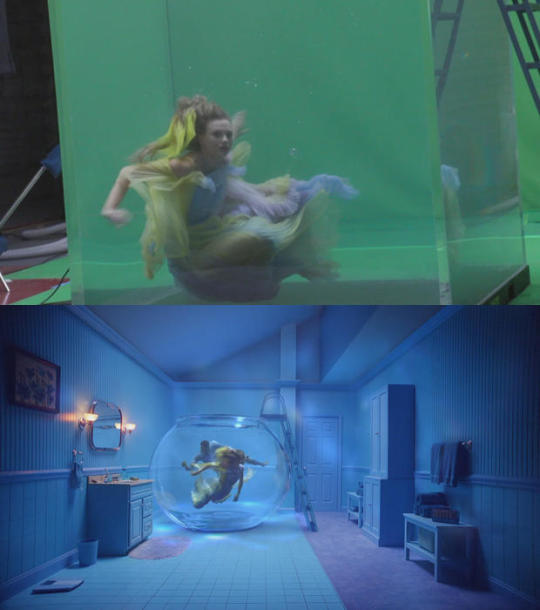
Taylor Swift filming the fish bowl sequence from her music video "Lover." CBS NEWS
"I very oftentimes remark that my life is like a fish bowl, and that, like, if I were to, like, fall in love, you know, somebody's choosing to be in that fish bowl with me. To jump into the fish bowl with me and live in that world just with me – it's not as depressing as it sounds, I promise! It's just symbolic!"
Talk about fish bowls: she's been dating British actor Joe Alwyn for three years. Seems he's up for a swim.
At the moment, Swift is, well, fully immersed in today. Beyond that, she says she doesn't know … and doesn't really want to.
Smith asked her, "Do you think about, you know, 'What am I gonna do in 20, 30 years?'"
"No, 'cause that puts me into what I call a panic spiral," Swift replied. "Like, I cannot do that. I've never been able to do that."
Why? "It just freaks me out. When I zoom out too far, I freak out. Do I know where I'm gonna be or even wanna be in 20 years? Absolutely not. Like, not taking a single day for granted."
"So, how far ahead do you look?"
"Six months. Just 'cause I have to plan shows and stuff. But I don't know what I'll do after this album. And I think that's great. I tell myself, like, it's actually really ungrateful to just assume that you have 20 years. Like, be stoked that you have today."
CBS News
70 notes
·
View notes
Text

Good morning! I hope you slept well and feel rested? Happy Hump Day! Currently sitting at my desk, in my study, attired only in my blue towelling robe, enjoying my first cuppa of the day.
Yesterday, they laid my beautiful friend to rest. I’m wondering how long it will take me to get over it. Lockdown is not helping. I yearn to socialise and go raving, and this particular girl was KEY to my social life. Everywhere I went, I expected to see her and, if she wasn’t there, I was disappointed! I miss her vibe; happy, upbeat, positive. I miss her smile and her laugh and her tut-tutting when I was inappropriate (often!) I re-posted a photo album yesterday and, to be honest, there are even more photos of her in my archive! She was everywhere and that’s just the way I liked it; I needed her everywhere! My life was better with her in it.
Before the English language goes to Hell in a handcart, you will find me correcting spelling, punctuation and grammar. You think these things don’t matter? Try applying for a job with a cover letter full of spelling mistakes and grammatical errors! You can say, “These are my records,” or you can say, “I spin discs,” or you can even say, “I DJ using my vinyl,” but you cannot pluralise ‘vinyl’! You cannot say, “I went to the record shop and bought some vinyls.” This word DOES not exist! If you want to use this word; expect to be laughed at.
When it comes to adult films, I am conflicted. I suspect many of you are too. They serve a valuable purpose and keep you healthy but, in reality, we all know adult films are shit! I suspect these films produce generation after generation of crap lovers; men who imagine it’s all about sticking it in and banging away! No wonder so many women take care of themselves once he’s rolled over and gone to sleep! How many men know how to kiss? Watching adult films will not teach you how to kiss. How off-putting is a bad kisser? There are so many ways to kiss and so many delicious body parts to kiss; no young man will ever learn that from adult films, and sex education in schools definitely won’t go there! There are fantastic online discussions about sex but how many men care enough to listen and pay attention? Is it a deal-breaker, ladies? Did you kick him to the kerb for lacking in skills? I wouldn’t blame you if you did!
Have a wonderful and well-endowed Wednesday. I love you all. Yes, a crazy, bald man loves and cares about you. And, remember, if you enjoyed this status, check out my catalogue of books on Amazon.
1 note
·
View note